Welcome to our archived feed of Essential Politics, from Jan. 25 through Feb. 18.
Bookmark latimes.com/essentialpolitics to get our latest at what’s happening in Sacramento and across the Golden State.
Looking for something we wrote when the session got started? Find our archived news feed here.
Make sure to follow us on Twitter for more, or subscribe to our free daily newsletter and the California Politics Podcast.
Find us over here
The latest Essential Politics news feed has gotten started over here.
You can bookmark latimes.com/essentialpolitics to track the latest in Sacramento and around the state.
The right stuff: Conservative Tom McClintock endorses Tom Del Beccaro for U.S. Senate
Joe Biden to headline California Democratic Party convention
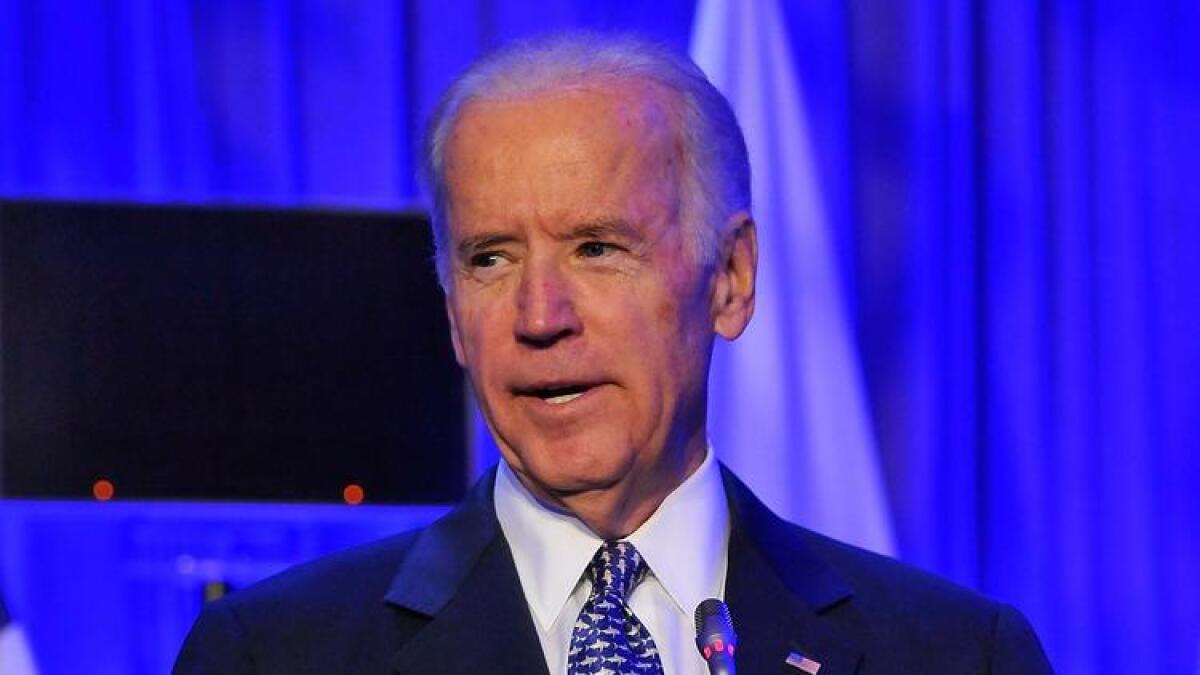
Vice President Joe Biden will rally the party faithful next weekend, as California Democrats gather for their annual convention.
The state Democratic Party has announced Biden will speak to attendees on Saturday, Feb. 27, at the convention in San Jose.
It’s worth noting that in the last open race for the White House, Biden took a pass on wooing California’s Democrats. He was the only candidate in the 2008 Democratic presidential race who skipped the California party’s convention in 2007.
Neither of this year’s major contenders, Vermont Sen. Bernie Sanders or former Secretary of State Hillary Clinton, is scheduled to attend next weekend.
Biden will be joined by Sen. Barbara Boxer and former Labor Secretary Robert Reich as the marquee attractions.
Fracking opponents take aim at Gov. Brown in new movie
A documentary that takes sharp aim at the use of extracting oil through hydraulic fracturing premieres tonight at showings in Los Angeles and San Francisco, and the title makes it clear where the filmmakers are pointing their critique.
The documentary is called, quite simply, “Dear Governor Brown.”
The 20-minute film focuses on California’s oil industry, with the filmmakers making it clear that Brown and state officials haven’t done enough when it comes to fracking.
The team behind the movie, led by filmmaker Jon Bowermaster and actor Mark Ruffalo, produced a similar critique of fracking in New York in 2012 titled “Dear Governor Cuomo.”
An invitation to tonight’s Los Angeles showing boasts that when it comes to California’s governor, the film “will expose his oily record, and lift up the voices most impacted by his decisions.”
Brown has faced continued criticism for his dismissal of calls to impose an outright moratorium on fracking in California. After signing a 2013 law to impose new state government oversight, he’s subsequently said he supports “efficient” oil production while looking for longer term replacements.
Ruffalo, an actor most recently known for his roles in the Oscar-nominated movie “Spotlight” and as the comic-book superhero the Hulk, has been dogging Brown for months about his record on oil drilling.
Assembly GOP lays out wish list in talks over health plans tax
The long, wonky negotiations over Gov. Jerry Brown’s proposal to revamp a tax on healthcare plans are now getting more overtly political.
The Assembly GOP caucus has staked out its bargaining stance, looking to dictate more than $800 million in spending that would be made possible by the new tax package.
Senate Republicans have taken a more hardline position against the proposal. Other GOP allies, including health insurers and the California Chamber of Commerce, publicly support the plan.
And on Thursday, the influential anti-tax group the Howard Jarvis Taxpayers Assn. said it’s neutral on the measure, which could provide political cover for typically tax-averse Republicans to come on board.
Immigrants would get financial help to become doctors, nurses under new legislation
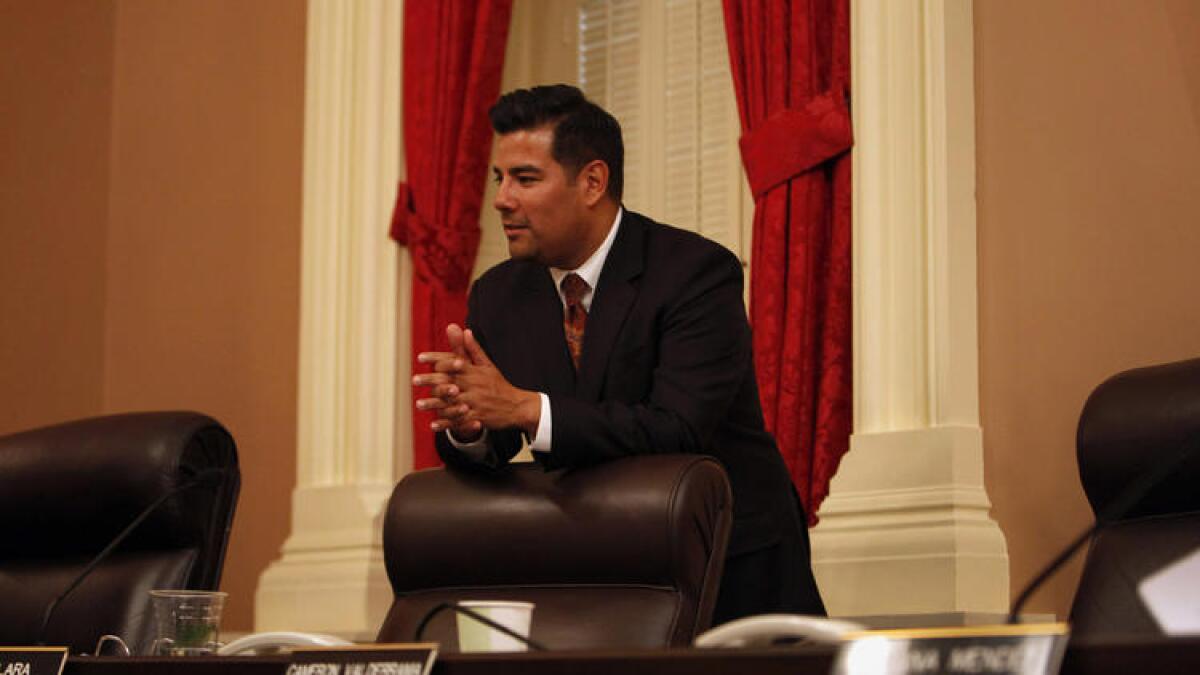
Immigrants in the country illegally who study to become physicians and nurses would be able to get the same financial help from the state provided to citizens under legislation announced Thursday by state Sen. Ricardo Lara (D-Bell Gardens).
Lara, who has pioneered other immigrant laws, said his bill is necessary to help address a shortage of medical workers in California, especially in under-served immigrant communities.
“Despite the ability for undocumented students to apply for a professional license, these future physicians, nurses and clinical social workers and medical assistants are unable to apply for scholarships or loan repayment,” Lara said in a statement. “This bill will strengthen California’s workforce by ensuring our skilled medical professionals can complete their education and contribute to the well-being of our state.”
The state Health Professions Education Foundation is a nonprofit group that awards scholarships and loan repayments of up to $105,000 to health professionals who are qualified to serve patients for whom English is a second language. The money comes from administrative fines and penalties on health plans, the millionaires tax for mental health services imposed by 2004’s Proposition 63, and health professional licensing surcharges.
Currently, health professionals need to be able to provide a social security number to be eligible for payments, which limits it to legal residents. Lara’s bill would allow applicants to use taxpayer identification numbers, which are available to noncitizens.
Follow along!
Former Central Valley legislator tapped for Air Resources Board
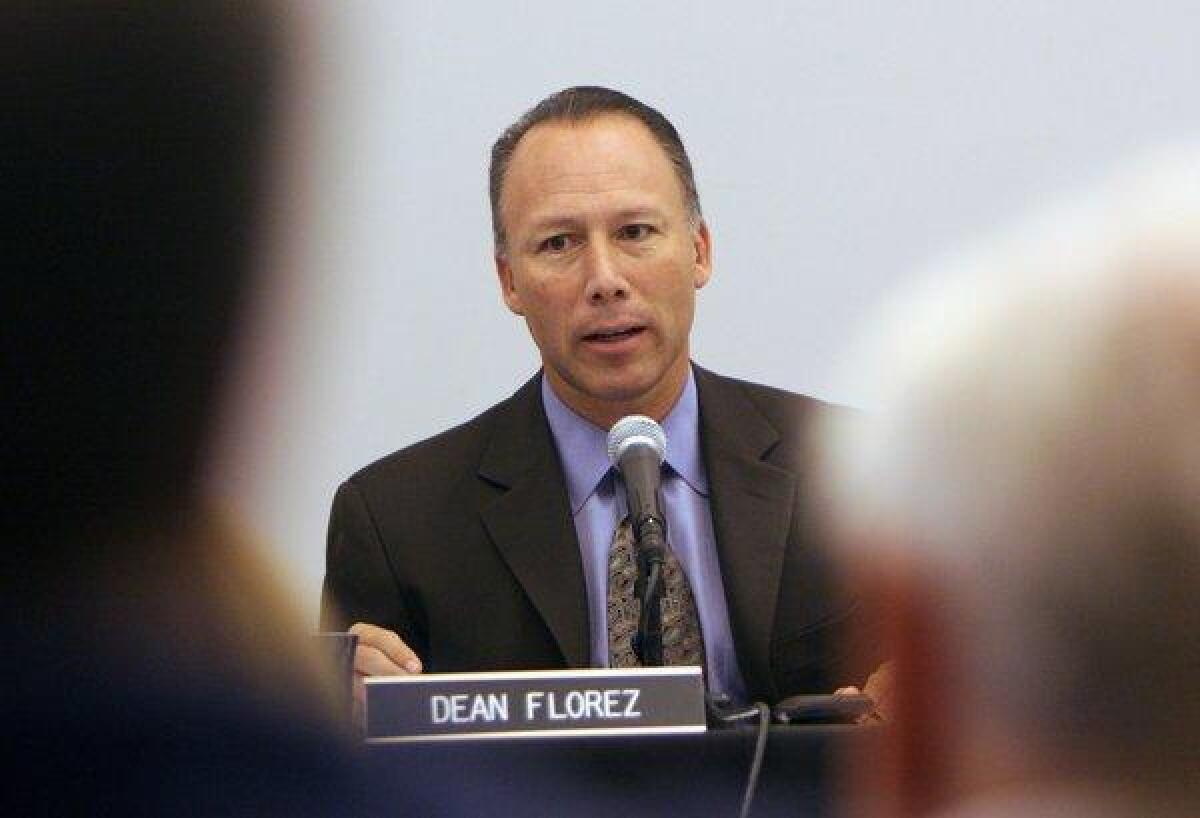
A former state senator who points to air pollution in his native Central Valley as a priority has been appointed to the California Air Resources Board, one of two spots on the powerful panel created through a law signed last year.
Dean Florez, a native of Kern County, was tapped on Wednesday afternoon by the Senate Rules Committee to become the newest member of the air board.
Senate leader Kevin de León (D-Los Angeles) said in a written statement that the former Democratic legislator has “the experience to fight for kids struggling to breathe in our communities and the resolve to stand up to the oil lobby who want to keep the status quo.”
Florez, 52, served for 12 years in the Legislature with most of that in the Senate, before leaving in 2010. He currently owns a public affairs company and has been active in higher education issues since leaving elected office.
Earlier this month, Assembly Speaker Toni Atkins (D-San Diego) appointed environmental advocate Diane Takvorian to the air pollution agency’s governing board. Both positions were created after Gov. Jerry Brown signed Atkins’ bill last year to expand the air board’s membership by two spots, with both new members tasked to speak on behalf of disadvantaged communities.
““Today’s ground zero on air pollution is located in communities of color in Los Angeles, Central Valley, and the Inland Empire,” said Florez in a written statement. “People there don’t drive high end cars, but they breathe dirty air and suffer from pollution more than others.”
Legislators introduce bipartisan student privacy bill
A trio of state Assembly members wants to prohibit school districts from collecting students’ Social Security numbers and other sensitive information.
The measure was inspired by news that 10 million public school students’ records -- that include Social Security numbers and medical information -- must be turned over to a parents advocacy organization that is suing the state Department of Education.
The parents’ suit contends that special needs students are not getting enough school resources.
Two Democratic Assembly members, Lorena Gonzalez of San Diego and Mike Gatto of Glendale, and one Republican, Melissa Melendez of Lake Elsinore, want to stop schools from collecting such data in the first place.
Their bill, which was introduced Wednesday, would bar schools from asking for Social Security numbers and other sensitive information.
“As a mom, I’ve seen my kids’ schools over the years request Social Security numbers, medical information, and other private information that they don’t need or have a right to,” Gonzalez said in a statement.
“Rather than expecting parents to have the knowledge and capacity to fight to protect their child’s privacy, we should get schools out of the business of asking in the first place.”
Legislation aims to close racial wage gap
A new wage-equality law aimed at helping women in California should be extended to also reduce disparities in pay by race, a state lawmaker said Wednesday.
Sen. Isadore Hall III (D-Compton) introduced a bill that would prohibit employers from paying workers a wage rate less than the rate paid to employees of a different race or ethnicity for “substantially similar” work.
“No employee should be denied an equal wage for an equal day of work,” said Hall, who is chairman of the Legislative Black Caucus, during a Capitol news conference. “It is an economic injustice. It is discriminatory. It is just wrong.”
Hall cited a 2013 study by the American Assn. of University Women that found African American men earn 75% of the average salary of a Caucasian male worker in California, while African American women make 64 cents, and Hispanic or Latina women make just 54 cents for every dollar that a white man earns.
The new standard would make it easier for employees to challenge what they believe is unfair pay, borrowing language from a gender pay law approved last year by the Legislature and governor.
Hall said his mother had to work three jobs to care for her six kids, which was difficult. “It is even more difficult to do when your job pays you less than your white co-workers,” he said.
The measure is supported by several civil rights activists, including Cassandra Jennings, president of the Greater Sacramento Urban League, who said the wage disparity is “unacceptable.”
“This puts many of our participants at a huge disadvantage in entering the workplace,” she said during the news conference to announce SB 1063.
School bus safety bill introduced after Whittier student’s death
Concerned by the death last year of a special needs teenager left on a bus during a heat wave, a state lawmaker on Tuesday proposed that California school buses be equipped with child-safety alarm systems.
Sen. Tony Mendoza (D-Artesia) said such alarms prompt the driver to inspect all seats before leaving the bus, making sure drivers do not leave children unattended.
“No parent should fear that their child will not return home safely at the end of the day,” Mendoza said. “My hope is that SB 1072 will prevent future tragedies by requiring every school bus in the state to be equipped with a child-safety alarm system.”
Mendoza was reacting to the September death of 19-year-old special needs student Hun Joon Lee, who regularly rode a school bus from his home in Whittier to the Sierra Education Center in Whittier.
When he didn’t return home on time one day, his parents called the school. Lee was found slumped in the aisle of a bus that had been parked for the day.
State senator tries again to ban elephant bullhooks
State Sen. Ricardo Lara (D-Bell Gardens) is making another run at a measure to outlaw the use of bullhooks when handling elephants.
Lara tried last year to make it a misdemeanor to use the sharp devices in order to train or manage elephants. But the measure was vetoed by Gov. Jerry Brown, who nixed a number of bills that would have created new crimes.
This time, Lara proposes adding a new section to the state’s Fish and Game Code to outlaw the use of bullhooks.
“I remain committed to protecting elephants from abusive management practices. It is a privilege to possess elephants in California and we should not tolerate mistreating elephants for any reason,” Lara said in a statement.
The city of Los Angeles passed a bullhook ban in 2014.
Some voters skipping intra-party races, says analyst
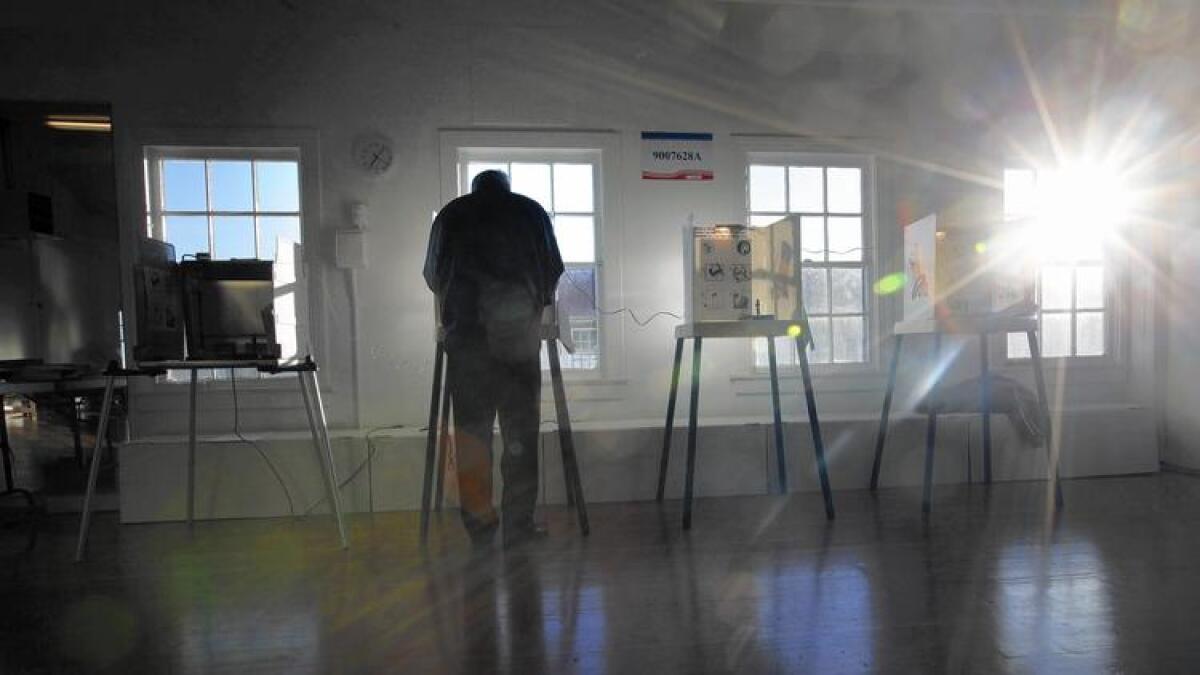
One of the selling points for California’s top-two primary system was that when two candidates from the same party moved on to the November election, they would have to court voters whose party was left out and thus create an advantage for more centrist candidates.
But if the voters without a party standard bearer simply skip that race altogether, then is the new system really working as promised?
That’s the question posed in a new column penned by Paul Mitchell, vice president of Political Data Inc. for the online news publication Capitol Weekly.
Mitchell has been tracking the “undervote” ballots from the last two election cycles, a phenomenon where a voter leaves one or more races blank. And he’s found that the percentage of undervotes is demonstrably higher in races featuring either two Democrats or two Republicans.
“And this undervote contains an unpleasant truth about the open primary,” writes Mitchell. “In some cases, voters from both sides just abstain from the process rather than serve as a counterbalance to extreme partisanship.”
Mitchell says that since 2012, there have been more than a dozen legislative races in which the percentage of undervotes was substantially higher than normal — and that all of them were intra-party contests.
“It is possible that trends will change as more voters become familiar with intra-party general elections,” he writes. “But for this to happen, it would probably require a big statewide intraparty race for governor, U.S. Senate or another constitutional office.”
The big, expensive ballot season is coming
A number of California’s most experienced political consultants say to keep an eye on what happens between now and early April, when backers of potential ballot measures are going to have to make some tough decisions about what they’re willing to spend on a November statewide election.
And at this point, there’s at least one analysis to suggest the grand total could be as high as $500 million by the time voters have their say on a bumper crop of ballot measures Nov. 8.
Like-minded governors sign energy accord
Newsom gets some celebrity support for gun effort
Scalia’s death prompts speculation about Kamala Harris
California Atty. Gen. Kamala Harris on Monday morning holds her first public event since Justice Antonin Scalia’s death and the subsequent speculation about her potential consideration to fill his vacancy.
Harris’ spokesman politely says the candidate is flattered, but focused on her Senate race.
Here’s why the speculation is unlikely to amount to more than just talk.
Loretta Sanchez garners backing of Latino Victory Fund
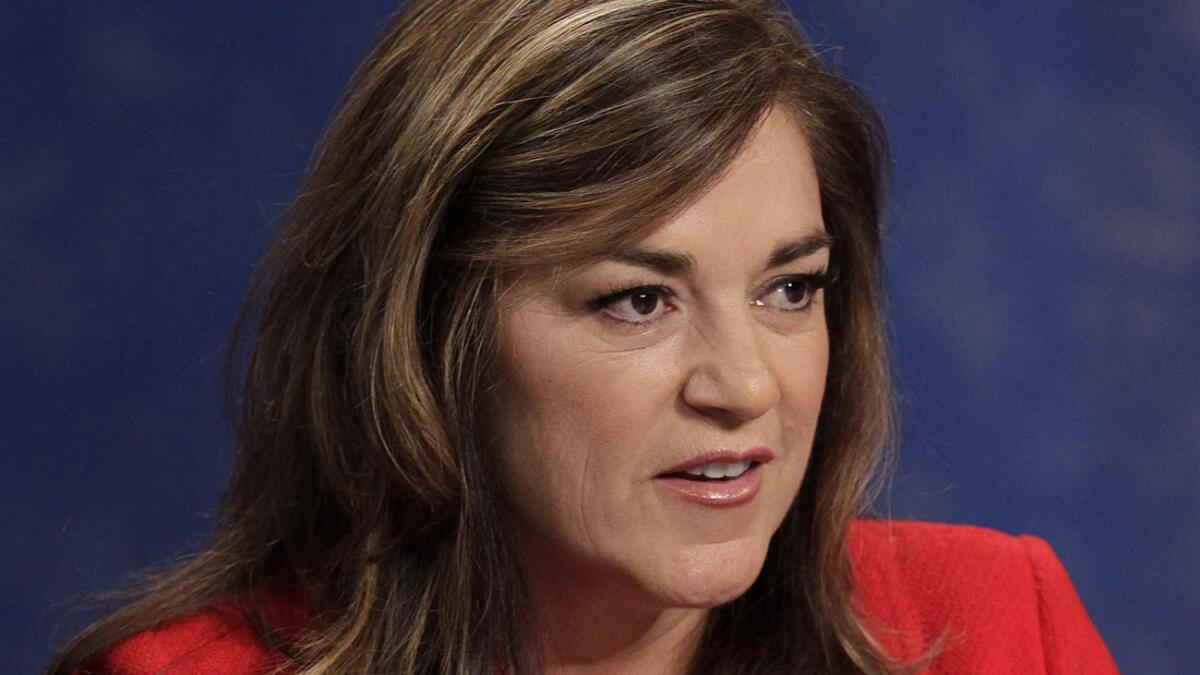
Senate hopeful Rep. Loretta Sanchez has earned the backing of the Latino Victory Fund, a political action committee that supports Latino candidates and includes billionaire environmental activist Tom Steyer and former Los Angeles Mayor Antonio Villaraigosa as co-chairmen.
The endorsement, which the Washington-based group will announce this morning, is not a major surprise. If elected, Sanchez would be the Senate’s first Latina. But she has a long way to go, and first faces a primary against California Atty. Gen. Kamala Harris.
That’s what is intriguing about the endorsement — Maya Harris, the sister of Sanchez’s top Democratic rival, is on the board of directors of the group’s parent organization, the Latino Victory Project.
Cristóbal Alex, president of the Latino Victory Project, praised Sanchez as a champion of “issues that the Latino community cares about, including working to improve the economy, to ensure that our children receive access to quality education and that our communities have a clean, safe environment.”
The Latino Victory Project was founded by actress Eva Longoria and businessman and Democratic fundraiser Henry R. Muñoz III. The group also aims to increase voter registration and turnout among Latinos.
Steyer, a former hedge fund manager and deep-pocketed Democratic donor, joined the Latino Victory Fund in January. He serves as a co-director along with Villaraigosa, Texas Rep. Joaquín Castro and Melissa Mark-Viverito , speaker of the New York City Council.
Jerry Brown to talk clean energy Tuesday
Big 2016 campaign moves in this week’s podcast
The 2016 campaign season in California was big news in the week that’s just ended, with one fewer candidate in the race for the U.S. Senate and new challenges for Gov. Jerry Brown’s political agenda.
In this week’s California Politics Podcast, we also discuss the intense debate over the future of the Coastal Commission, and the fascinating politics of gender equity bills introduced in the Legislature.
You can subscribe the podcast via iTunes here.
How much did Prop. 47 save the state? New estimate says more than Brown promised
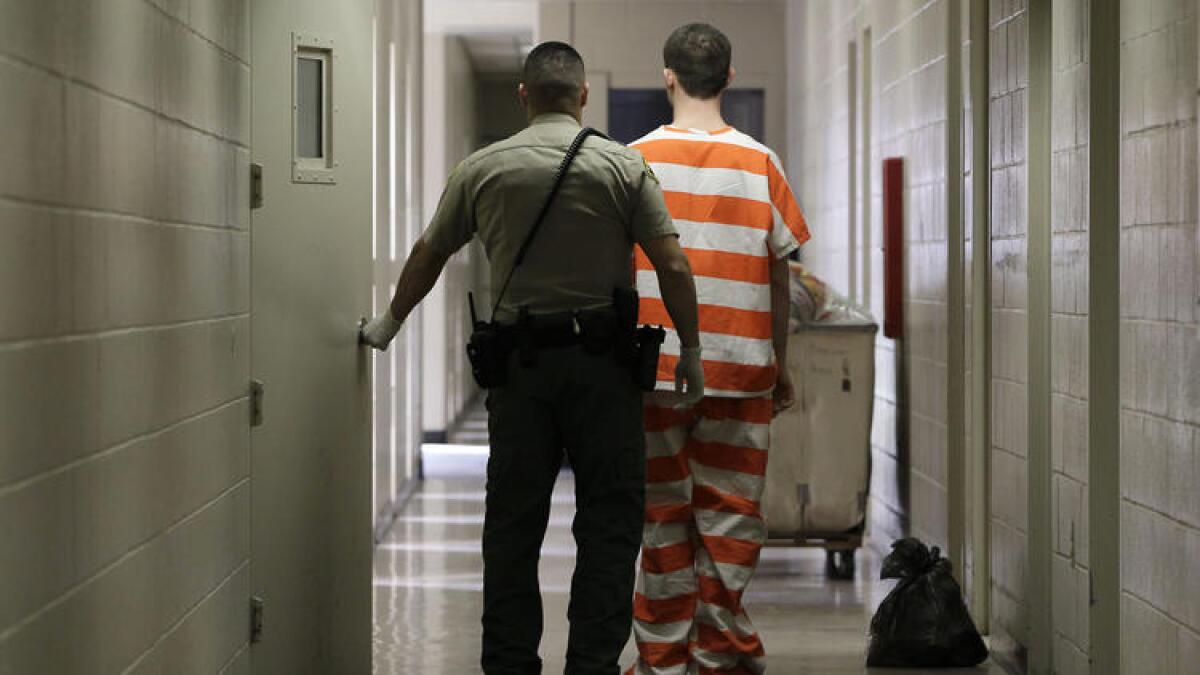
The Brown administration may have underestimated the state’s savings as a result of Proposition 47 by as much as $100 million, says the independent Legislative Analyst’s Office.
Prop. 47, an initiative passed by California voters in 2014, downgraded drug possession and other nonviolent felonies to misdemeanors.
Brown’s budget had estimated that the savings would be about $39 million.
In a report released Friday suggesting the total savings could be as high as $130 million, the analyst’s office says Brown’s figures underestimate the savings in court costs and prison housing and overestimate how much state agencies have spent to implement the law.
The money, by law, is supposed to go into a fund that helps pay for mental health and substance abuse programs, combat truancy and lower dropout rates, along with victim services.
“While the administration’s approach would benefit the General Fund ... it does so at the expense of the programs that receive funding from [the account],” the report said.
Rocky Chavez endorses Duf Sundheim for U.S. Senate
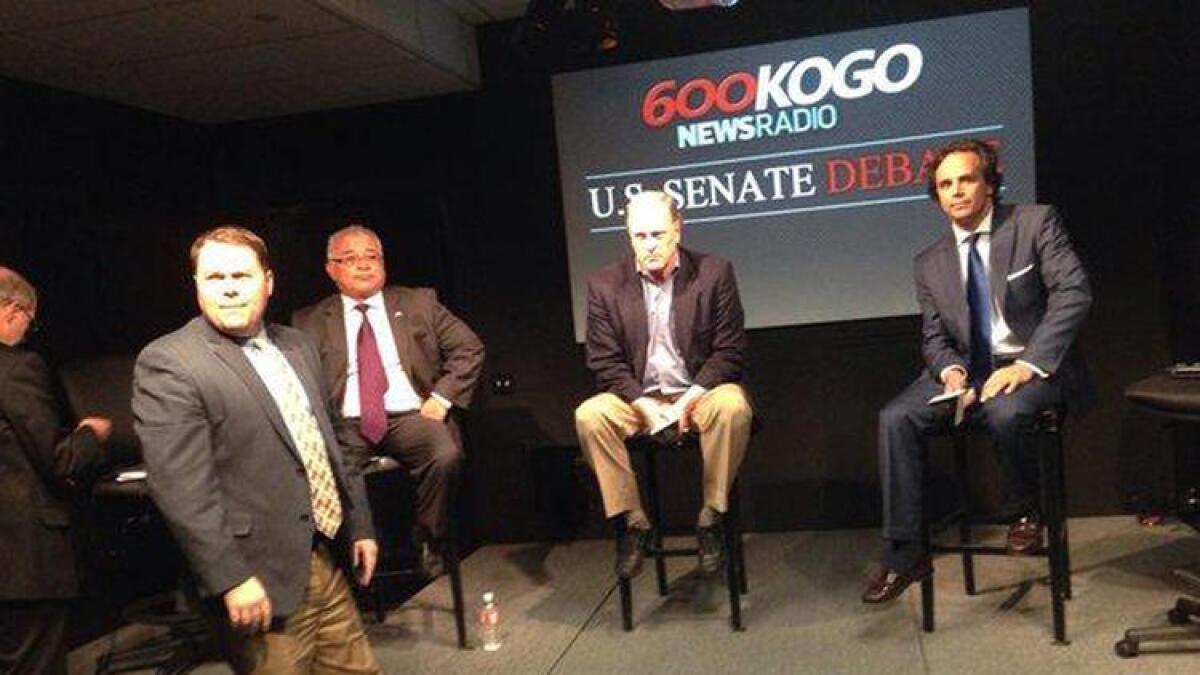
Oceanside Assemblyman Rocky Chavez is endorsing Republican candidate George “Duf” Sundheim’s U.S. Senate bid, just days after ending his own candidacy.
“We also need someone who understands the diverse nature of our state and can represent all Californians,” Chavez, a Republican and former Marine colonel, said in a statement released by the Sundheim campaign. “Duf Sundheim is the candidate who not only understands these issues, but has a track record of achievement. That is why I am endorsing him today.”
Chavez’s endorsement snubs Tom Del Beccaro, who is considered the more conservative of the three. Both Del Beccaro and Sundheim are Bay Area attorneys who had served as chairmen of the California Republican Party.
Chavez and Sundheim aligned on several issues, including supporting a “pathway to legal status” for the estimated 11 million immigrants in the country illegally.
Chavez plans to run for reelection in his Republican-leaning Assembly district, which includes Oceanside, Encinitas and Carlsbad. Other candidates currently in that race include Republicans Phil Graham, the stepson of former Gov. Pete Wilson, and Oceanside City Councilman Jerry Kern.
Obama tells Southern California donors he’s accomplished 80% of his campaign promises
We had a behind-the-scenes perch for President Obama’s fundraisers in Hancock Park on Thursday.
Find out who was there, what John Legend sang and what Obama had to say about Los Angeles.
Gov. Jerry Brown opposes $9-billion school bond
Gov. Jerry Brown has come out against a $9-billion school bond measure that will go before voters in November, erecting a political hurdle for advocates of new spending on school construction.
Rep. Duncan Hunter vapes on Capitol Hill to protest e-cigarette plane ban
Rep. Duncan Hunter (R-Alpine) took a drag off his pocket vaporizer during a Capitol Hill hearing Thursday to protest a proposed ban of electronic cigarettes on airplanes.
“So, this is called a -- this is called a vaporizer,” Hunter said, holding back a smile after blowing out a dramatic white cloud.
“There is no burning. There is nothing noxious about this whatsoever,” Hunter went on to say. “This has helped thousands of people quit smoking. It’s helped me quit smoking.”
The room broke out in giggles after the stunt but Hunter is deadly serious when it comes to opposing efforts to restrict the use of e-cigarettes. Hunter wrote a letter to House Minority Leader Nancy Pelosi (D-San Francisco) last month, saying, “E-cigarettes are a suitable alternative to cigarettes, and they could very well save my life.”
Hunter’s vaping didn’t save the day for e-cigarette smokers. The Transportation and Infrastructure Committee adopted the amendment by a 33-26 vote, USA Today reported.
Hunter is so well known around Washington for vaping that other members of Congress unfamiliar with the devices have asked to try his out, said Hunter’s chief of staff, Joe Kasper. Hunter always lets them take a puff.
“He makes no effort to conceal it,” Kasper said. “People know him as somebody who not only vapes but is a huge proponent.”
Hunter recently toured the facilities of a Los Angeles-based company, Vaporcade, that sells a combination cellphone vaporizer called the Jupiter, he said.
Kasper said Hunter was working on legislation to create a regulatory framework for e-cigarettes.
The Food and Drug Administration has reported that the potential health effects of electronic cigarettes have not been fully studied.
No go on No Fly gun bill
Obama offers first reaction to Supreme Court climate decision at Bay Area fundraiser
President Obama told Democratic donors in the Bay Area, “don’t despair” over a Supreme Court decision to stay a case involving his Environmental Protection Agency’s clean power initiative.
“The Supreme Court did something unusual this week. The centerpiece of our climate action plan involves working with states like California to come up with a strategy for reducing their carbon emissions,” the president said as he attended a fundraiser for the Democratic National Committee.
The remarks, his first on the topic since the ruling earlier this week, were captured by a reporter allowed into the fundraiser for a portion of Obama’s talk with donors at Steve Westly’s home in Atherton.
Obama explained his administration’s strategy comes under the Clean Air Act, “which the Supreme Court says requires the Environmental Protection Agency to regulate carbon emissions if we can show, as science has clearly shown, damage to public health.”
The president said his team is “very confident we are on strong legal footing here.”
“One of reasons I want to talk about this is because in the last couple of days I’ve heard people say, ‘The Supreme Court struck down the clean power plant rule. That’s not true, so don’t despair people,” Obama said. “This a legal decision that says, ‘Hold on until we review the legality.’ We are very firm in terms of the legal footing here… “
The president called for “investing in the future, not the past” and then went on to give boilerplate fundraising remarks.
Republicans fundraise off Obama visit
As we’ve been reporting in our Essential Politics newsletter, President Obama is headed to Los Angeles this afternoon to tape with Ellen DeGeneres and attend two Democratic National Committee fundraisers in Hancock Park. John Legend is performing in one of them.
Live in L.A. and worried about the roads? Here’s a list of street closures.
And here’s how California Republicans are preparing.
Gov. Jerry Brown tries to make good on promise to cut oil use in half

Remember that bruising fight over SB 350 and whether the state should slash the petroleum use in half?
It’s back again, this year in the form of Gov. Jerry Brown’s budget proposal.
The budget the governor submitted to the Legislature last month proposed spending a third of the state’s cap-and-trade funds, about $1 billion, on public transit, promoting electric vehicles and other programs, all with the explicit goal of cutting oil use by 50% by 2030. Those dollars were collected through the auction of pollution credits to companies that emit greenhouse gases.
In doing so, the governor’s decision to place such a visible marker could be adding a sizable new wrinkle to budget negotiations this spring in Sacramento.
Lawmaker proposes aid-in-dying law hotline
Californians with questions about the state’s aid-in-dying law would be able to call a toll-free hotline under a proposal by state Sen. Bill Monning (D-Carmel).
Monning, a co-author of the new End of Life Option Act, introduced legislation Thursday that would require the California Department of Public Health to establish and operate the hotline.
The new law allows physicians in California to prescribe lethal doses of drugs for use by terminally ill patients who want to hasten their deaths.
“As California moves forward to implement this pioneering law, it is important that there is a resource available to patients, doctors, or anyone who is interested in learning how the new law works,” Monning said in a statement.
The California Medical Assn. recently issued guidelines for people wanting to use the new law, which won’t take effect until 90 days after the end of the current special legislative session on healthcare.
Auditor finds waste, overbilling, forgery by state workers
More than two dozen state employees mishandled or wasted a total of $372,000 through improper expenses, overcharging for time worked, filing false claims and not disclosing outside income, a state audit found Thursday.
State Auditor Elaine Howle detailed the misconduct in a report on whistleblower investigations completed by her office during the last two years.
“Through our investigations, we found misuse of state resources, forgery, false time reporting, violations of financial interests disclosure, and waste of state funds,” Howle wrote to Gov. Jerry Brown in a letter accompanying the report.
Ten cases were detailed in the report, which included the following findings:
-- Four psychiatrists at Patton State Hospital were paid $296,800 for work they did not do as each put in much less than the 40 hours per week they claimed during a one-year period. Some worked as few as 22 hours.
-- A supervising nurse for California Correctional Health Care Services, the agency overseeing prison health care appointed by federal judges, was paid $6,000 more than he was due after he forged military documents and falsely claimed he worked military reservist duties.
-- A psychiatrist at the Department of State Hospitals violated state law by failing to disclose income of $29,800 that he received from a pharmaceutical company.
-- The state wasted $25,600 in taxpayer funds during one year when it charged only eight hours of leave for 12 employees at Porterville Developmental Center who missed scheduled nine-hour or 10-hour workdays.
-- The state Resources Recycling and Recovery office wasted $4,200 on improper use of rental vehicles for state travel by renting from a private firm instead of a state government office.
--The Department of Water Resources wasted taxpayer funds when it improperly reimbursed three employees $4,500 in excess of the allowed amount for training they received.
On the ‘short list’ of California GOP contenders for higher office: Kevin Faulconer
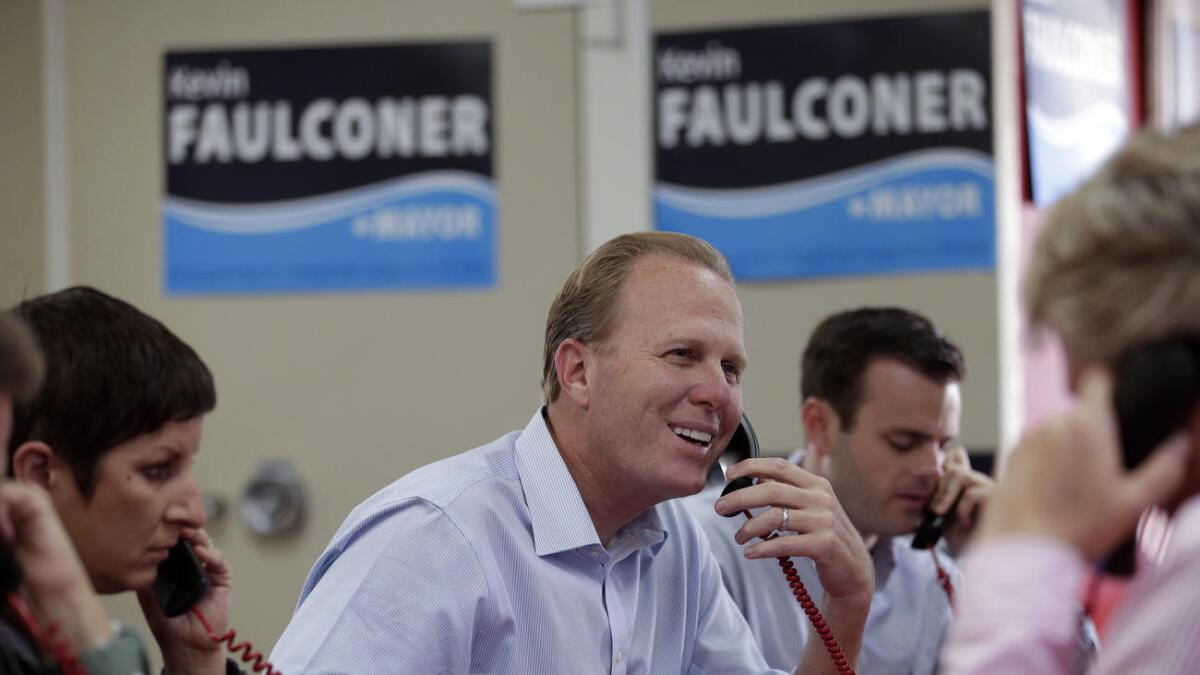
San Diego Mayor Kevin Faulconer, the only Republican leading one of the nation’s top 10 cities, is a rising star in the California GOP after just two years in office.
Bill Whalen, a fellow at Stanford’s Hoover Institution who was a speechwriter for former Republican Gov. Pete Wilson, says Faulconer’s on the “short list” of possible Republican candidates for governor in 2018.
So, the Los Angeles Times sat down with the mayor for a brief chat inside San Diego City Hall.
Congresswoman showcases mass shooting victims ... and she has no plans to let up
On the floor of the U.S. House on Thursday, Rep. Jackie Speier (D-Hillsborough) read the names of 18 people who died last month in mass shootings.
She plans to make it a habit.
Speier, who was shot five times while on a congressional fact-finding mission into the People’s Temple in Jonestown in 1978, said she will return to the House floor monthly to read the names of mass shooting victims from the previous month. She also plans to create a memorial wall for the victims outside her office.
“I’ve had enough of Congress’ failure to lead,” Speier said.
Lamenting that she didn’t have enough time to read the names of those who were shot but didn’t die, Speier told the stories of the 18 people killed in California, Delaware, Florida, Tennessee, Virginia and Washington and other states. Their photos and names will be added to the wall outside her Washington office in the Rayburn House Office Building.
Several members began similar memorial walls outside their congressional offices for military members who died in Iraq or Afghanistan. A handful remain.
“May the dead rest in peace and the wounded recover completely. It’s time, it’s time for Congress to end this bloodshed,” she said.
The day after the horrific attacks in San Bernardino, Speier said she’d boycott the House chamber or stay seated instead of standing for another moment of silence to shooting victims. She said the tributes are hollow because they have not been followed by action from Congress.
A new leader of state’s Black Caucus
State Sen. Isadore Hall III (D-Compton) is taking over the chairmanship of the California Legislative Black Caucus after Assemblyman Reginald Jones-Sawyer, Sr. (D–Los Angeles) abruptly resigned from the leadership position.
Jones-Sawyer said in a statement that the switch at midnight Friday would allow him to focus on legislative priorities as he seeks reelection.
“We’ve also worked tirelessly to raise awareness and increase the dialogue about the issues affecting our community,” Jones-Sawyer said, “while prioritizing the expansion of representation of our community at all levels of government.”
But Capitol sources said there has been tension over the caucus’ mixed record of success legislatively and the loss of top black staffers in the Legislature.
Hall, who is in a heated battle to win an open congressional seat, said in a statement that his goal is to expand the 12-member caucus in the 120-member Legislature through this year’s elections.
“As chair, I remain resolute in my commitment to expand African American representation in the California Legislature,” and to “promote workforce development and vocational education opportunities” as well as “protect and improve access to high quality preschool for every African American child,” he said.
Hall said other priorities would include increasing high school graduation rates and the number of black students who gain admission to and graduate from California colleges and universities.
Could developmental disability funding be at play in negotiations for tax on healthcare plans?
For more than a year, the state has grappled with how to overhaul a tax on healthcare plans. Now, as Gov. Jerry Brown’s proposal winds through the Legislature, there’s another question surfacing: What will the money be spent on?
The proposal got its first public hearing Wednesday. Legislators on the Assembly’s public health panel did not vote on the plan, but did hear a rundown of the complicated system of levies and tax breaks proposed to replace the state’s current tax on managed care organizations, which is set to expire in June.
Revenues from the new tax will help pay for Medi-Cal, state-subsidized healthcare for the poor. But members of both parties have also called for money to fund services for the developmentally disabled.
Assemblywoman Catharine Baker (R-San Ramon) pointedly clarified on Wednesday that the current plan includes “zero funding” for the developmentally disabled.
Assemblyman Rob Bonta (D-Oakland) said there was “separately work being done to get to a deal” to secure such funding.
The proposal has garnered substantial industry support, ranging from the California Assn. of Health Plans to individual heavyweights such as Blue Shield and Kaiser Permanente.
The health plans have historically been vital in attracting the Republican votes necessary to meet the two-thirds threshold for new taxes. Assemblyman Brian Maienschein (R-San Diego) said the number of supporters for the proposal was significant.
Still, he said, “we’re not there yet.” He and Baker were not outwardly hostile to the plan, but stopped short of signaling support.
The Senate will hold its own informational hearing later today. Votes on the proposal will likely be held next week, according to legislative sources.
Second bill proposed to tighten campaign finance and ethics rules for state tax board
Yet another bill has been proposed to tighten ethics and campaign finance standards for the state’s elected tax board.
The latest proposal, made Wednesday by Assemblyman Bill Dodd (D-Napa) and Board of Equalization member Fiona Ma, would close loopholes that have allowed those with business before the panel to benefit the campaigns of members. The loopholes were identified in recent reports by the Los Angeles Times.
Dodd’s AB 1828 would ban political contributions from people and businesses that have appeals cases before the board a year before and after the case is adjudicated.
The bill, like one introduced last month by state Sen. Jerry Hill (D-San Mateo), also would prohibit board members from soliciting donations to nonprofit groups during the same two-year period. Hill’s measure would require board members to recuse themselves from acting on any matter involving a campaign contributor.
“It’s important that the public is given confidence that tax rulings before the Board are based on their merits and absent of the appearance of influence or favoritism,” Dodd said in a statement.
The Times recently reported that Board Chairman Jerome Horton solicited a donation to a charity founded by his wife from SpaceX after voting on a policy that could benefit the firm.
In addition, the newspaper reported that firms got around the $250 limit on contributions by having employees make dozens of $249 contributions or by giving money to a political action committee that then donated to board members.
Ethics agency launches revision of state’s Political Reform Act
The state’s ethics watchdog agency has launched a yearlong overhaul of California’s law governing campaign finance and lobbying with an eye toward streamlining and simplifying rules that many politicians complain are too complex, the agency’s top official said Wednesday.
Jodi Remke, chairwoman of the Fair Political Practices Commission, said the 41-year-old Political Reform Act needs to be updated, in part, to reflect changes in the way special interests try to influence elections and those who are elected.
“It’s impossible to understand,” Remke said of the law in a meeting with The Times’ Sacramento bureau. “If we can really focus on this and clean it up, it would be a huge step forward.”
In a step separate from the Act’s review, Remke said Wednesday that campaign contribution limits will likely be looked at to see whether they are adequate, given that far more money is spent independently from candidates by special interest groups. “Are we chasing our tails talking about contribution limits when that’s not really the game anymore?” she asked.
FPPC officials have long said the law needs to reflect the desire to prevent serious corruption instead of tripping up public officials on relatively minor issues.
“The goal is that we get away from the small, ticky-tacky technical violations so we can focus on the more serious violations,” Remke said. She also said there may be changes to get more people to disclose activity that should be considered as lobbying.
Faster disclosure of information, she said, is hindered by the state’s antiquated Cal-Access campaign finance system, which advocates and elections officials have urged should be overhauled.
Remke said the FPPC is working with UC Berkeley School of Law’s California Constitutional Center and the UC Davis School of Law where students are working on a first draft that then will go through revision by a citizens’ panel before being taken up by the FPPC.
California Democrats ask FTC to stop ‘gay conversion’ therapy
Two Democratic members of California’s congressional delegation say they want the Federal Trade Commission to help stop “gay conversion therapy” targeted toward LGBT youth.
In a letter addressed to the commission, Reps. Jackie Speier (Hillsborough) and Ted Lieu (Torrance) urged the FTC to “take all actions possible” to stop the practice, which they called “unfair, deceptive, and fraudulent.” The letter also was signed by U.S. Sens. Patty Murray (D-Wash.) and Cory Booker (D-N.J.).
Conversion therapy puts LGBT children and youth at risk of suicide and substance abuse, the letter said, and “provokes guilt, anxiety, and societal rejection that negatively impacts healthy development of children and youth.”
Programs that aim to convert minors from gay to straight are already illegal in California, thanks to a law Lieu helped pass.
Similar bans have been introduced in Congress, including one by Rep. Adam Schiff (D-Burbank), but have stalled. The White House has said it supports such a ban, saying conversion therapy “is neither medically nor ethically appropriate.”
Obama gets regular updates on Aliso Canyon leak
President Obama is getting regular updates about the ongoing methane leak in Porter Ranch, White House Press Secretary Josh Earnest told reporters Wednesday.
“That is a very serious situation out in California,” Earnest said on Air Force One at the start of a trip that will conclude in California. “I know the president has been updated regularly on this.”
The leaking gas well in Aliso Canyon prompted the evacuation of more than 4,000 homes but could be plugged in the next several days, the Southern California Gas Co. said Tuesday amid a weeks-long saga.
Prompted by questions from Rep. Brad Sherman (D-Sherman Oaks) at a speech to House Democrats in January, Obama and Vice President Joe Biden both committed to push for national gas storage standards to prevent future leaks.
Obama is on his way to California for several political fundraisers, an appearance on “The Ellen DeGeneres Show” and a summit about the Asia Pacific region. A stop in Porter Ranch or at the site of the spill is not on his schedule.
Pot tax proposed
Gun violence initiative eligible for Capitol compromise
The ballot measure backed by Lt. Gov. Gavin Newsom to impose new rules including background checks before buying ammunition now appears eligible for negotiation in the state Capitol -- that is, if either Newsom or legislators are interested.
Newsom tweeted on Tuesday that his initiative had gathered 25% of the voter signatures needed to qualify for the November ballot. That’s the threshold set by a 2014 law for legislative hearings on an initiative and could, if all sides agree, result in a compromise instead of a political campaign.
But so far the law that was hailed as major reform of California’s initiative process has produced no legislative hearings or political truces. Newsom’s proposal, drafted with the help of national groups, will be one to watch as it mirrors several prior gun violence proposals in the Legislature.
Legislative Democrats dine with Brown, state leaders
It looks like there was quite the party Tuesday night in downtown Sacramento, as Assembly Democrats gathered with Gov. Jerry Brown at the historic Stanford Mansion.
The gathering wasn’t announced ahead of time, but became pretty obvious once lawmakers opened up their Twitter, Instagram, and Facebook accounts later in the evening.
The private dinner offered legislative Democrats a chance to schmooze with the state’s constitutional officers. And given all statewide officials are Democrats, it was a single-party affair.
L.A. mayor is heading to Nevada to support Clinton
Gov. Jerry Brown criticizes U.S. Supreme Court’s blocking of Obama climate plan
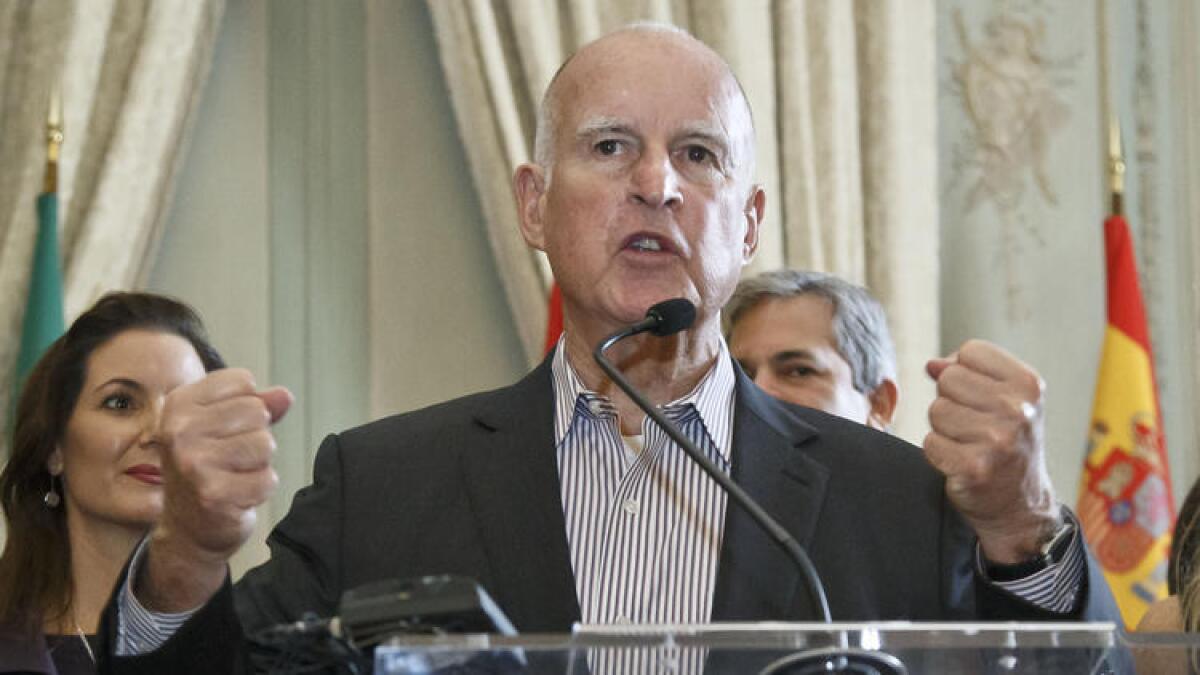
Gov. Jerry Brown wasted little time on Tuesday criticizing the decision by the U.S. Supreme Court to block the Obama administration’s carbon pollution limits on power plants.
“As the world gets hotter and closer to irreversible climate change, these justices appear tone-deaf as they fiddle with procedural niceties,” said Brown in a written statement released by his office.
It’s not the first time the governor has come to the defense of the federal effort, launched by President Obama last summer, to reduce carbon emissions from power plants by almost a third over the next decade and a half. In November, California joined 24 other states to formally support the Clean Power Plan in lawsuits brought by West Virginia, Texas, and other states. Brown later called out the leaders in those states for what he called “crass obstructionism.”
The governor was no less pointed in his comments issued on Tuesday.
“This arbitrary roadblock does incalculable damage and undermines America’s climate leadership,” said Brown’s statement on the high court’s action. “But make no mistake, this won’t stop California from continuing to do its part under the Clean Power Plan.”
San Diego mayor still strongly in Marco Rubio’s corner
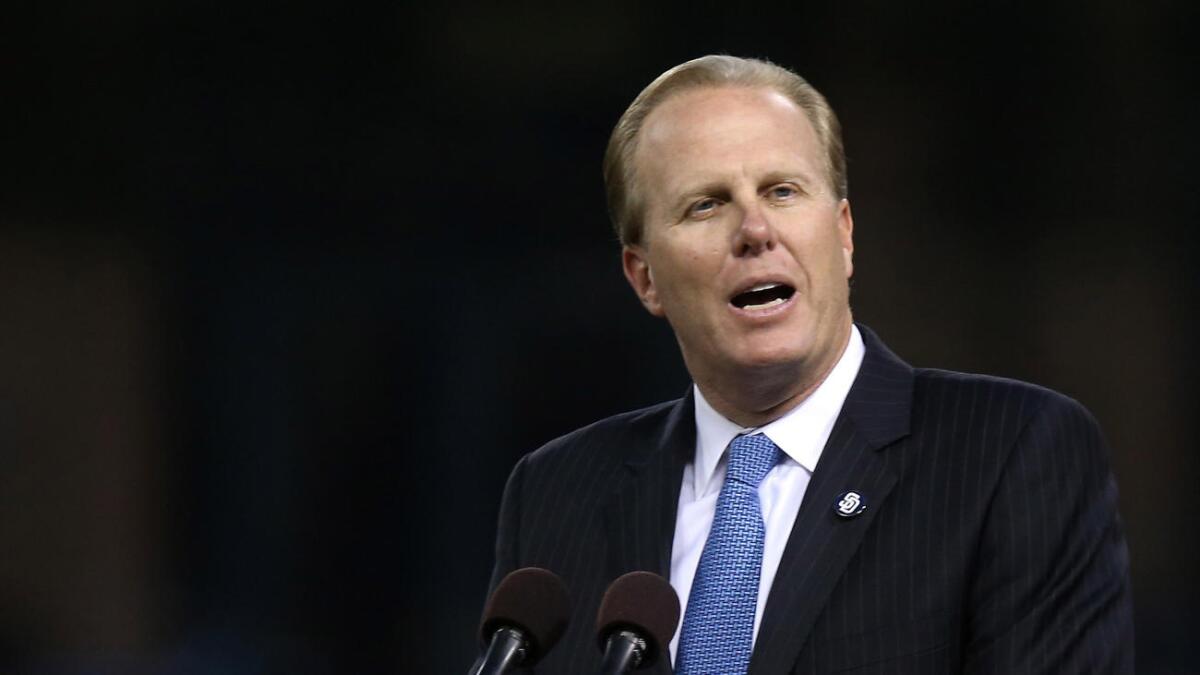
San Diego Mayor Kevin Faulconer, a co-chairman of Republican presidential hopeful Marco Rubio’s presidential campaign in California, said before returns came in from New Hampshire he expected his guy to do “very well today.”
“I’ve been around enough to know that in campaigns and debates, you’re going to do great in some, you’re going to wish you did things differently in others,” Faulconer said in an interview. “Every race is a long race. I think he’s very, very well positioned.”
Faulconer is the only Republican mayor representing one of the nation’s 10 largest cities.
Faulconer, considered a rising star in a California Republican Party that is in dire need of one, said Rubio’s life story — he is the son of Cuban immigrants — and inspiring political message will connect with Californians.
“He has a very compelling story, and our job is to get that out,” he said.
The primary is June 7.
Rocky Chavez’s switch to Assembly race sparks Republican turmoil
A Republican who already had devoted time and money to winning a state Assembly seat is not happy with Rocky Chavez’s surprise decision to drop out of the U.S. Senate race and instead run for reelection to his Oceanside district.
Phil Graham, the stepson of former California Republican Gov. Pete Wilson, said he never would have entered the race for the 76th Assembly District if he knew Chavez may opt to run again. Chavez, a former Marine colonel, had assured Graham he was all-in for the Senate race, according to a statement Graham’s campaign released Tuesday.
“I took him at his word when he said he was going to bring a Marine’s tenacity to the US Senate campaign, so I was surprised yesterday when I read that he had dropped out,” Graham said in the statement. “I feel I have a lot to offer in Sacramento, but if Rocky hadn’t told me and the rest of California he was committed to the US Senate race, I would not have run for his Assembly seat.”
Graham, an Encinitas executive, said he will spend the next few days talking with his supporters and “considering my options.” He said a number of people are encouraging him to stay in the race.
He raised $355,000 for his campaign in 2015 and had $221,000 in cash on hand at the end of the year. Chavez had $601 in his Assembly campaign account at the end of 2015.
Another Republican in the running, Oceanside City Councilman Jerry Kern, did not respond to a request for comment Tuesday. Kern raised $184,000 and had $138,000 in the bank at the end of the year, state campaign finance records show.
The district includes Oceanside, Encinitas, Carlsbad and the Camp Pendleton Marine Corps base. Its voter registration leans strongly Republican.
San Diego political consultant John Hoy said he wouldn’t be surprised to see Graham and Kern stay in the race, even though Chavez will have strong support as the incumbent and someone with a military background.
“Any person who has invested that much time and energy and money is going to be reluctant to throw in the towel,” Hoy said.
Rep. Knight asks Congress for Porter Ranch hearing

Rep. Steve Knight (R-Palmdale) asked for a congressional hearing Tuesday on the cause of the Porter Ranch gas leak, which has forced thousands from their homes.
Knight, whose district includes much of the Porter Ranch area, sent a letter to House Transportation and Infrastructure Committee’s Subcommittee on Railways, Pipelines and Hazardous Materials Chairman Jeff Denham (R-Turlock) asking him to examine policy around underground natural gas storage facilities, such as the one in Aliso Canyon that has been leaking since October.
Knight also has asked the committee to consider legislation he sponsored last week that would require the Department of Transportation to set safety standards for natural gas storage facilities that considers the economic effects of the standards.
One of Knight’s opponents for reelection, Democrat Bryan Caforio, has criticized the legislation, saying the freshman lawmaker consulted the energy industry for what the bill should include. Caforio also charges Knight didn’t act quickly enough to respond to the leak.
Rep. Brad Sherman (D-Porter Ranch) also has filed legislation and pushed President Obama to commit to new agency rules regarding gas storage.
John Chiang ‘strongly leaning’ toward 2018 run for governor
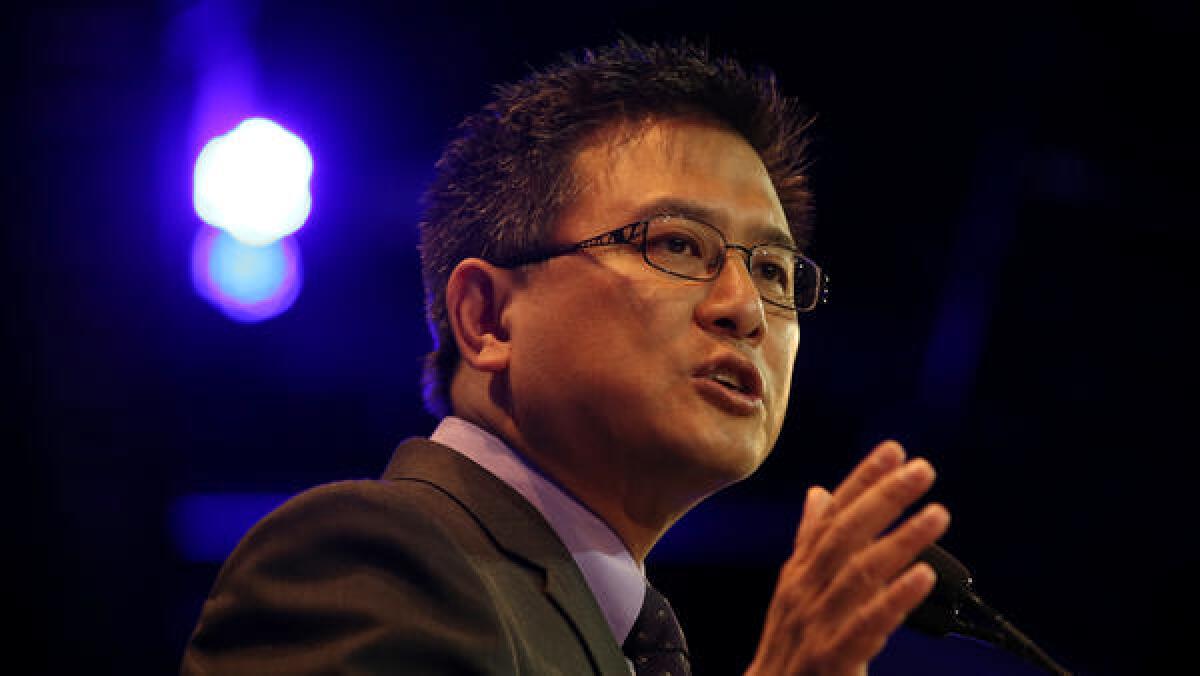
California state Treasurer John Chiang told a group of business leaders on Tuesday that he’s nearing a decision on running for governor in 2018 and could wrap up that process as soon as April.
And he hinted at what the decision will be.
“I’m strongly leaning toward it,” he said.
Chiang, 53, would join Lt. Gov. Gavin Newsom as early contenders in what could be a crowded field of Democrats vying to succeed Gov. Jerry Brown. Former Los Angeles Mayor Antonio Villaraigosa also is considering a run, and others could jump in as the 2018 campaign season kicks into gear.
Prior to being elected treasurer in 2014, Chiang spent eight years as state controller and a stint on the state Board of Equalization.
In brief remarks to reporters after a midday speech to the California Business Roundtable, the Los Angeles Democrat touted his experience in managing the state’s finances during the depths of the recession.
“If you’re going to have the big dreams, you have to finance it,” said Chiang in how his prior experience would play to his advantage in a campaign for governor.
Chiang reported $3.2 million in campaign funds in his most recent state filing, while Newsom reported about $8.4 million on hand.
The treasurer seemed eager to discuss the idea of running for governor, happily fielding the question from the business group after a brief presentation marketed as a speech on public finance.
“I’m almost there,” Chiang told the group.
Backers of 2016 water bond call off campaign
An effort to place a $4.9-billion water bond on the November statewide ballot has officially ended before it began, with supporters saying they’re putting their hopes on the Legislature crafting a bond measure later this year.
“Legislative leadership has expressed an interest in natural resources bonds, and we are committed to working with them to place a measure on the 2016 ballot through the legislative process,” two of the bond’s backers, Jerry Meral of the Natural Heritage Institute and Jay Ziegler of The Nature Conservancy, wrote in a letter to supporters.
Meral had submitted multiple versions of a water bond initiative to elections officials and said in an interview last month that he was waiting to see whether a well-funded campaign could be mobilized for its passage. In the written statement, Meral and Ziegler noted that it may help to allow more of the money from 2014’s water bond, Proposition 1, to be spent first.
But money — the campaign kind in what’s shaping up to be a huge year for ballot initiatives — was also a key factor.
“The cost of gaining a place on this November’s ballot has risen dramatically in the last few weeks,” wrote the two men in their recent letter. “An extraordinary eleven initiatives are in circulation today, with several more about to enter circulation. This has driven the price of [voter] signatures to a very high level.”
Transportation Committee chair wants legislators on bullet train panel
Legislative oversight of California’s high-speed train project could increase under a new proposal to add two legislators to the system’s board of directors.
Assemblyman Jim Frazier (D-Oakley), who chairs the Assembly’s Transportation Committee, introduced a bill Tuesday that would add one sitting legislator from each house as a non-voting member to the bullet train’s existing nine member governing panel.
“It is the Legislature’s job to act in the interest of California’s residents and participate in conversations about a program of this size and complexity,” Frazier said in a written statement.
Four members of the existing California High Speed Rail Authority board of directors are appointed by legislators, with Gov. Jerry Brown appointing five of the directors.
Frazier’s bill comes at a particularly intense time for the train project. Last month, the agency’s top officials told lawmakers that the project could take longer than expected to complete, though potentially cost less. And while the $68-billion effort has always had critics in Republican circles in Sacramento, more questions are now being raised by Democratic legislators.
Frazier also announced on Tuesday that he’s scheduled an oversight hearing for March 28 on the rail agency’s new business plan.
Managed care tax: where the health plans stand
Yesterday marked one step forward in what has been arduous negotiations to overhaul a tax on healthcare plans to help pay for Medi-Cal: the administration of Gov. Jerry Brown finally revealed its proposal (in the form of two identical bills).
But the proposal still has a high political bar to clear — a two-thirds vote in the Legislature, which requires Republican votes. To sway tax-averse GOP legislators, the opinions of health plans themselves will be crucial.
If they endorse, or don’t vociferously oppose, the proposal, it could assuage Republican worries that the tax package might lead to increased costs for consumers.
Here’s where some healthcare companies have landed so far:
- The California Assn. of Health Plans, the main trade association for the industry, is still evaluating the proposal. “Having the bill in print allows the process to move forward,” said spokeswoman Nicole Kasabian Evans.
- Kaiser Permanente is neutral, but struck a positive tone: “From what we’ve seen ... we believe this proposal is a balanced one that will not negatively impact our purchasers or members,” said Amy Thoma, a Kaiser spokeswoman. “We appreciate the efforts of the administration and legislature to ensure this proposal won’t impede our ability to provide high-quality, affordable healthcare to all.”
- The Local Health Plans of California, an association of 16 not-for-profit plans, backs the measure. Brianna Lierman, the group’s CEO, said the proposal is “fair and meets federal requirements.”
- Cigna released a letter last week, before the proposal was officially introduced, saying the current structure “creates substantial competitive market advantages for some California plans at the expense of others.” The company remains opposed.
Audience at live radio debate startled by Rocky Chavez’s announcement
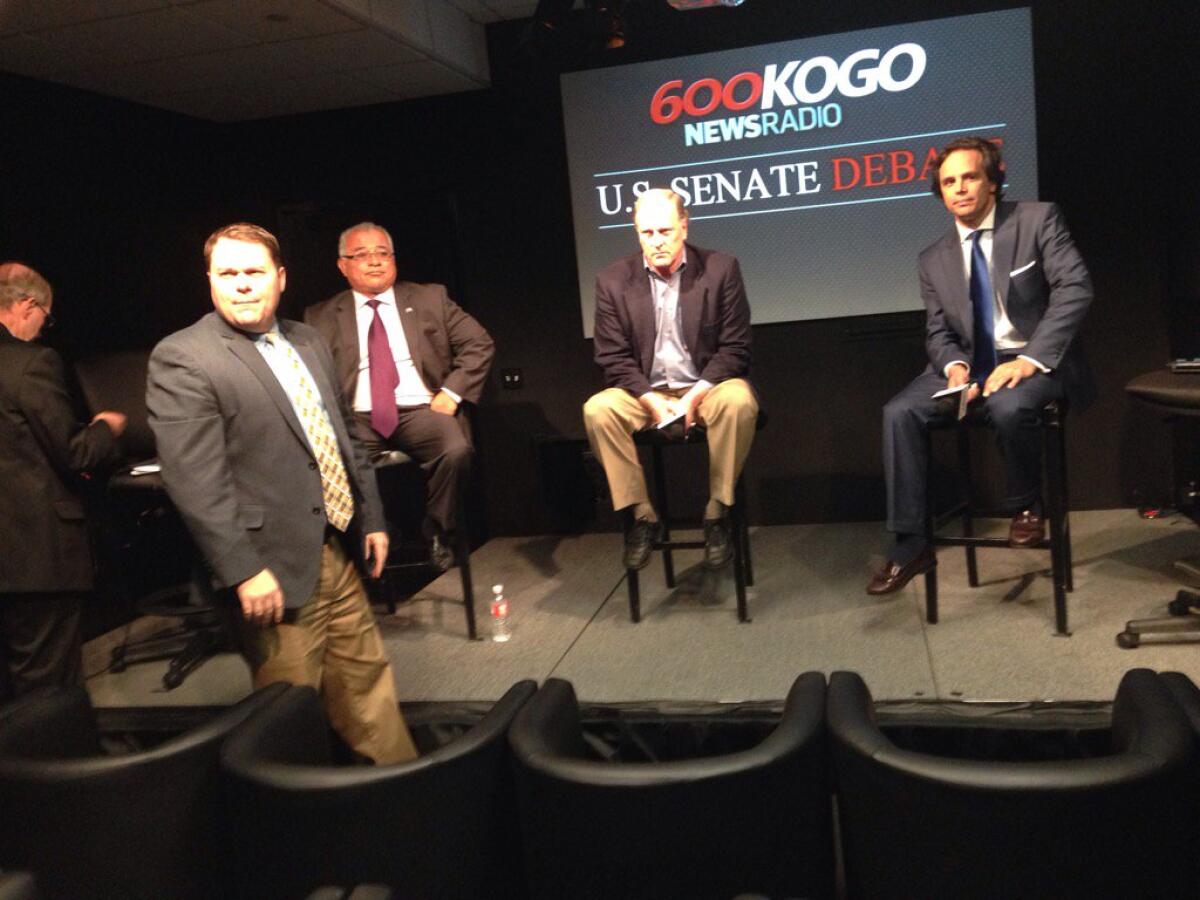
Assemblyman Rocky Chavez abruptly announced he was dropping out of the U.S. Senate race at the beginning of a live debate among the Republican candidates in San Diego on Monday evening.
Chavez was scheduled to debate GOP rivals George “Duf” Sundhiem and Tom Del Becarro, both Bay Area attorneys. A gasp came from the audience at the KOGO-AM radio station when Chavez opened the debate with his decision.
Chavez, a former Marine colonel, said he decided to bow out to give one of the remaining Republicans in the race a better chance of surviving the June 7 primary and making it to the general election.
Under California’s top-two primary system, the two candidates who receive the most votes in June, regardless of party, will face off in the general election. All recent polls how showed the two Democratic candidates, state Atty. Gen. Kamala Harris and Rep. Loretta Sanchez of Santa Ana, leading by a wide margin.
Chavez said he will instead run for reelection to his Oceanside Assembly seat.
Carl DeMaio was tipped about Rocky Chavez’s plans
Chavez ends U.S. Senate bid
It’s almost showtime for the GOP Senate debate
Looking for funding for earthquake warning system
In case you missed this story from Rong-Gon Lin II and Rosanna Xia, four state lawmakers are pushing more funding for an earthquake early-warning system that has been stalled by a lack of money.
Two separate bills, SB 438 and AB 1346, were amended Monday to ask that $23 million from the state General Fund be made available.
“There’s no valid reason not to make this relatively small investment in an early-warning system that has the potential to save the lives of Californians,” state Sen. Jerry Hill (D-San Mateo) said in a statement urging others to support the measure.
Hill, Sen. Bob Hertzberg (D-Van Nuys) and Assemblyman Adam Gray (D-Merced), who is carrying the bill in the Assembly, are calling for the repeal of a current state law that prohibits spending state general fund dollars on an earthquake early-warning system.
Host of tonight’s GOP Senate debate felt the sting of political treachery
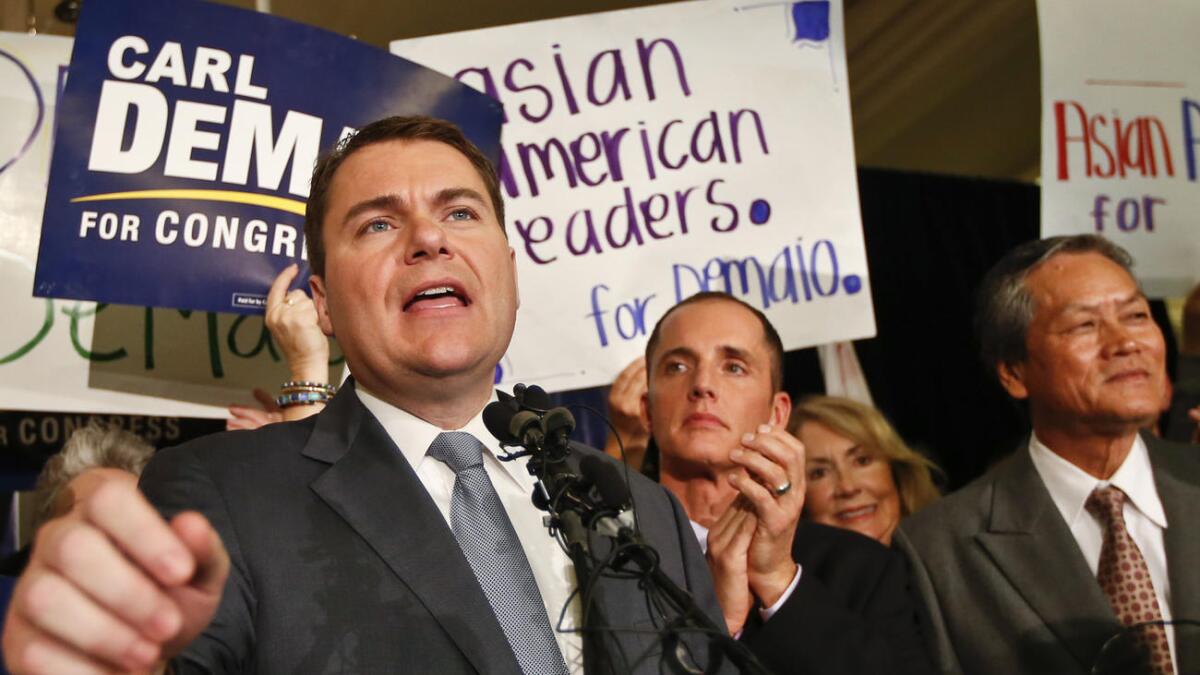
Radio talk show host Carl DeMaio, who organized tonight’s debate among the top three California Republicans running for U.S. Senate, landed his job at KOGO-AM (600) after a bizarre twist in his promising political career.
The former San Diego city councilman, known as a hard-charging Republican, had challenged Democratic Rep. Scott Peters in 2014, losing by just over 6,000 votes in a district closely split between Republicans and Democratic voters.
DeMaio blamed his narrow defeat on a crippling allegation by a former staff member who, as the election approached, accused the candidate of sexual harassment.
Seven months after the election, that ex-staff member, Todd Bosnich, admitted he made the whole thing up.
Bosnich in June of last year told a federal judge that he lied when he said he had gotten an anonymous email threatening that he would never work in politics again if he revealed that he had been sexually harassed by DeMaio. Bosnich pleaded guilty to a felony charge of obstruction of justice by lying to the FBI about the email and was sentenced to five years’ probation.
He admitted he sent the email himself through a dummy Yahoo account and then took the email to the Peters campaign, which turned it over to San Diego police.
DeMaio, who also lost a race for mayor in 2012, now hosts an afternoon talk show on KOGO-AM (600), which will livestream tonight’s debate at www.KOGO.com. DeMaio also has joined forces with former San Jose Mayor Chuck Reed in a 2018 ballot initiative campaign to place new limits on pensions for government employees.
DeMaio will moderate tonight’s one-hour debate between Assemblyman Rocky Chavez of Oceanside, Palo Alto attorney George “Duf” Sundheim and Walnut Creek attorney Tom Del Becarro. Both Sundheim and Del Becarro are former chairmen of the California Republican Party.
California’s presidential ballot is (sort of) ready to go
When California voters cast ballots on June 7 for the state’s presidential primary, there will be 43 names from which to choose.
At least, that’s how it’s looking as of now.
Secretary of State Alex Padilla released his list of “generally recognized” presidential candidates, a reflection of California’s unique rules that gives its top elections official some discretion on who gets included.
Among Republicans, all seven of the candidates on the stage this past weekend in New Hampshire are included, plus Carly Fiorina and former Virginia Gov. Jim Gilmore. It does not include those who have either dropped out or suspended their campaigns.
For Democrats, the list is much longer than just Hillary Clinton and Sen. Bernie Sanders (I-Vt.). It includes San Diego businessman Rocky De La Fuente and five other lesser known challengers.
And the ballot will include a bevy of presidential candidates for the Green, American Independent, Libertarian, and Peace and Freedom parties.
While election law allows a presidential candidate to also get on the ballot by circulating nomination papers, it also explicitly allows the secretary of state discretion to decide which candidates are “generally recognized throughout the United States or California.”
Things can change, and the law allows Padilla to add names to the list of presidential hopefuls until April 1. But he can’t remove names from the list unless a candidate formally asks him to do so.
Incoming Assembly speaker announces senior staff
Both women will assume their posts on March 7, when Anthony Rendon (D-Lakewood) takes over as Assembly speaker.
California lawmakers spend time in Nevada campaigning for Clinton
Some California lawmakers are dividing their time between their home state and Nevada these days as they try to give presidential candidate Hillary Clinton a boost ahead of the Silver State’s Democratic caucus on Feb. 20.
On Saturday, Senate leader Kevin de León (D-Los Angeles) led a caravan of California lawmakers and dozens of volunteers with the task of getting Nevadans to participate in the caucus and support Clinton. The Senate leader also appeared with former President Bill Clinton at a get-out-the-vote rally in Las Vegas.
De León tweeted from Reno and Las Vegas, where he was joined by Democratic Sens. Holly Mitchell of Los Angeles and Ben Allen of Santa Monica and Assemblyman Jimmy Gomez (D-Echo Park).
“Hillary Clinton knows how to fight and win, and I believe that with her as president, California will have an effective and tireless partner in Washington who will fight to do at the national level what we have done here on the state level,” de León said in a statement.
Backer of Sen. Janet Nguyen convicted of illegally reimbursing campaign funds
An Orange County man pleaded guilty Friday to illegally laundering campaign contributions for state Sen. Janet Nguyen’s 2012 campaign for an Orange County supervisor seat.
The investigation — conducted jointly by the Fair Political Practices Commission and the Orange County district attorney’s office — found that Son Truong Nguyen reimbursed a total of $13,000 to campaign contributors, obscuring the true source of the funds.
Nguyen, of Fountain Valley, was convicted of 10 counts of unlawful contributions, a misdemeanor. He was sentenced to three years’ probation and 40 hours of community service; he will also have to pay a $20,000 fine to resolve the investigation by the state’s ethics agency.
The investigation did not lead to any charges for Sen. Nguyen, who served as supervisor until her election to the Senate in 2014.
Jay Wierenga, an FPPC spokesman, said “there was insufficient evidence to prove [Sen.] Nguyen knew of or was aware of the laundered funds.”
Energy secretary to visit Aliso Canyon
Energy Secretary Ernest J. Moniz has agreed to travel to Porter Ranch to visit the site of the ongoing Aliso Canyon natural gas leak, Sen. Barbara Boxer’s office announced Friday afternoon.
There is not a scheduled date for the visit, which Moniz agreed to in a phone call with the California senator Friday.
“After our conversation today, I am very grateful that Secretary Moniz will visit Aliso Canyon and step up his personal involvement in this issue,” Boxer said in a statement.
A state official said Thursday that the leak at Southern California Gas Co.’s Aliso Canyon Natural Gas Storage Facility, which has spewed natural gas for more than 100 days and had caused thousands to evacuate, could be plugged at the earliest within a week.
Sen. Dianne Feinstein and Boxer want Moniz to lead a review by federal agencies of how the leak happened and how state and federal officials responded.
The Senate added an amendment ordering that review to energy legislation earlier in the week, but the bill stalled Thursday.
$1.8 billion so far on state drought efforts

Gov. Jerry Brown’s budget team reports more than half of the money earmarked by lawmakers to combat the effects of California’s drought has been either spent or set in motion for spending, some two years after the governor’s formal drought declaration.
In a letter delivered to legislative leaders, Brown’s staff tallies some $1.8 billion in spending commitments through the end of the current fiscal year. Most of that is on long-term actions, while $628 million has been committed to more immediate needs — from immediate drought relief to drinking water supplies to groundwater monitoring.
The report, a requirement under last summer’s budget agreement, concludes that a full 92% of the short-term water projects have been identified for financial help.
In all, the drought funding effort totals $3.7 billion. The money comes from a variety of sources, including general fund tax dollars and bond money approved by voters in 2014 as Proposition 1.
Villaraigosa pitch: Focus on restoring ‘California dream’
It’s early, but political markers continue to be planted for what is expected to be California’s wide-open, hotly contested 2018 governor’s race.
Democratic Lt. Gov. Gavin Newsom, the only candidate officially in the race and raising money at this point, in October launched a ballot initiative to toughen the state’s already strict gun laws, and a month later backed an initiative to legalize and regulate the recreational use of marijuana in California.
On Friday, former Los Angeles Mayor Antonio Villaraigosa, who is expected to jump into the race in the near future, would say only that he would “be honored to serve again.”
He did, however, provide a glimpse of what the focus of a gubernatorial campaign could be – education, poverty and Californians he says have been left behind in the “new economy.” The Democrat has been on a “listening tour” up and down the state for the last month, spending most of that time in impoverished Central Valley towns flattened by the recession and water crisis.
“If the challenge before us is to restore the luster of the California dream, then I think we need to focus on the areas left behind,” Villaraigosa told The Times.
An October Field Poll found 42% of registered voters said they were inclined to support Villaraigosa; 41% supported Newsom; and 36% supported Los Angeles Mayor Eric Garcetti.
An internal poll conducted for the Newsom campaign released last week found — surprise, surprise — the lieutenant governor far ahead of the field.
Did we mention it’s way early?
Congressional delegation warns against firing Coastal Commission executive director
Ten members of California’s congressional delegation warned the California Coastal Commission on Friday not to fire Executive Director John Lester.
In a letter led by Rep. Alan Lowenthal (D-Long Beach), the members wrote Lester has balanced “economic opportunity, access, and conservation for the benefit of all Californians.”
“We are concerned that firing the Executive Director of the Coastal Commission will threaten the non-partisan nature of the Commission’s work and endanger the very laws that have been so successfully upheld over the past decades,” the letter states. “We are concerned about any actions that would politicize Commission staff and subsequently risk the legacy and validity of the Commission.”
Lester’s detractors have said the push to remove him is due to his job performance. His supporters say he is being ousted by pro-development forces.
Lester’s employment will be considered at a public meeting of the commission Wednesday in Morro Bay.
The nine other Democrats who signed the letter were Reps. Julia Brownley (Westlake Village), John Garamendi (Walnut Grove), Sam Farr (Carmel), Janice Hahn (Los Angeles), Michael Honda (San Jose), Jared Huffman (San Rafael), Ted Lieu (Torrance), Zoe Lofgren (San Jose) and Adam Schiff (Burbank).
Talking overhaul of utility oversight in this week’s podcast
In 1911, California’s constitution was amended to create a state railroad commission, an entity that over time added more and more duties and ultimately was renamed the California Public Utilities Commission.
Now, after several years of scandal and criticism, a bipartisan group of legislators wants to abolish the quasi-independent agency.
On this week’s episode of the California Politics Podcast, our reporter roundtable analyzes the new proposal to do away with the CPUC. We also take a look at campaign fundraising in the race for the U.S. Senate and other 2016 electoral efforts.
You can subscribe to the free podcast via iTunes.
Northern California congressman gets a promotion
California delegation undecided on who will win the Super Bowl
Like millions of Americans, California’s delegation is planning to watch the Super Bowl on Sunday, but they are divided on whether the Denver Broncos or the Carolina Panthers will win.
The game at Levi’s Stadium in Santa Clara is scheduled to begin at 3:30 p.m.
Rep. Grace Napolitano (D-Norwalk) said she has to cheer for the Broncos.
“If I say other than Broncos, my daughter-in-law will have kittens, she’s been a Broncos fan for decades,” she said.
Many members said that they want to watch a close game and that it’d be nice to see Broncos quarterback Peyton Manning win what might be his last Super Bowl.
Rep. Jim Costa (D-Fresno) said he expects the Panthers have a better chance, but “I’m kind of an underdog fan. I’d like to see Manning go out with a Super Bowl,” Costa said.
As a 49ers fan, Costa said he’s more excited about rekindling a rivalry with the forthcoming Los Angeles Rams.
Rep. Jeff Denham (R-Turlock) said it would be exciting to see Manning win, but “I think the Panthers are tough to beat.”
Rep. Pete Aguilar (D-Redlands) said he’s backed the Panthers since before the playoffs, so “I’m going to stick with them, although my heart is telling me it would be nice if Peyton won on his way out.”

Rep. Doug LaMalfa (R-Richvale) first grumbled that the 49ers should have made it to the Super Bowl being played in their stadium.
“If I was betting with my wallet, I’d bet the Panthers, but I’d probably be sentimentally for Peyton Manning,” LaMalfa said. “The Broncos will show pretty well, but I still think the Panthers are probably going to, by the fourth quarter, overwhelm them.”
Rep. Eric Swalwell (D-Dublin) said it might upset Oakland Raiders fans, but he’s rooting for the Broncos too.
“I just like Peyton Manning. How can you not admire just a good guy like that?” he said.
Rep. Mark DeSaulnier (D-Concord) said he thinks the Carolina Panthers will win. Why?
“They’re favored. I don’t watch football that much,” he said.
Some members haven’t picked sides, or don’t plan to watch.
Rep. Paul Cook (R-Yucca Valley) said he didn’t know enough to pick a team.
“Carolina’s going to be tough, but I don’t know,” Cook said. “It’s hard to guess, and I’m not a betting man.”
Rep. Susan Davis (D-San Diego) said she normally doesn’t pick a team until after the game starts.
“I usually figure who I’m going to cheer for depending upon some silly little thing,” Davis said.
Rep. Norma Torres (D-Pomona) said she doesn’t much care who plays. She’s going to make carne asada tacos, salsa and chicken wings for the fans in her house and then she’ll head out shopping.
As for the guy who represents the district where the game is being played? Michael Honda (D-San Jose) says his focus is on security.
Rep. Darrell Issa schedules campaign kickoff
Rep. Darrell Issa will kick off his bid for a ninth term with a $25 per-person campaign event Feb. 20.
The Vista Republican serves on the House Judiciary and Foreign Affairs Committees. He’s perhaps best known to Californians for bankrolling the recall of Democratic Gov. Gray Davis in 2003. He emerged on the national stage for repeatedly challenging the Obama administration from his role as chairman of the House Oversight and Government Reform Committee.
Issa, who annually is ranked the richest member of Congress, made most of his fortune in the 1990s while leading Directed Electronics Inc., a Vista-based manufacturer of vehicle antitheft devices that he created.
Issa started the calendar year with $3.8 million in the bank, according to his most recent campaign finance report. Douglas Applegate, the only Democrat who has announced a bid for the seat, started 2016 with $11,554 in cash on hand.
Issa’s event is scheduled for 5:30 p.m. Feb. 20 at the Vista Entertainment Center.
Candidates face off in a boisterous 24th Congressional District debate
There were nine candidates on stage — some had filed paperwork to run for office, some had not, and a few just had a website. At any rate, the hopefuls looking to replace retiring U.S. Rep. Lois Capps (D-Santa Barbara) all had their say at a debate at Cal Poly San Luis Obispo on Thursday night.
It was the first time the public got to hear from all the candidates in the hot race that is attracting a flood of financial contributions from celebrities and political action committees to the top contenders. But for the most part the crowd got engaged with other, lesser-known candidates.
Democrat William Ostrander, the executive director of a nonprofit working to remove the influence of money in politics, got the college crowd going early with his populist message, including calling for a 0.2% tax on financial transactions on Wall Street.
“Help me change the system,” he said.
Republican financial planner Matt Kokkonen got big applause attacking Obamacare while Jeff Oshins, a homeland security analyst, who talked mainly about reducing student debt, got laughs with a lighthearted demeanor and general aloofness.
Oshins, a former congressional staffer, said he would go to Washington, D.C., and confront his colleagues to work harder. “I don’t care, I’ll fight the ...,” he said, to a roar of laughter from a few hundred people in the crowd. (Anyone there was skipping the Democratic presidential debate, which happened at the same time.)
Democratic Santa Barbara County Supervisor Salud Carbajal, who has Capps’ endorsement and a large fundraising advantage, focused on his immigrant roots, raising the federal minimum wage and his support for President Obama’s call for free community college.
Twenty-seven-year-old Republican businessman Justin Fareed, who has turned heads with his large fundraising haul, asked Carbajal how the nation could fund “free college” without increasing the national debt. Carbajal did not respond.
Fareed talked about decreasing the nation’s spending and debt, but also was questioned directly by Oshins about whether he would sign a pledge to never increase taxes. That time, Fareed did not respond.
Democratic Santa Barbara Mayor Helene Schneider remained mostly out of the fray, instead offering a defense of Planned Parenthood and taking federal action to stop the “epidemic of sexual assaults and rapes.”
She also made a subtle dig at her fellow Democrat Carbajal, who has received wide party establishment support, saying she was an independent decision maker who would not be a “yes man.”
Republican state Assemblyman K.H. “Katcho” Achadjian of San Luis Obispo billed himself as bipartisan and someone who could get things done.
In his closing speech, he pulled out a framed copy of a newspaper editorial calling him a “champion of consensus.”
Initiative to extend taxes on wealthy cleared for voter signatures
One of the most talked-about initiative campaigns of the 2016 election cycle received clearance Thursday afternoon to begin gathering voter signatures: the effort to extend temporary taxes on California’s highest-income earners.
The proposal, backed by a coalition of organized labor and healthcare groups, would keep those higher tax rates on the books an additional 12 years, expiring in 2030 instead of 2018.
The initiative is a modified version of 2012’s Proposition 30, a sales and income tax increase promoted at the time by Gov. Jerry Brown as necessary to help balance the state’s budget. The new version keeps the 1% to 3% hike in income tax rates on the most wealthy, while ditching the more unpopular sales tax provision.
A report from the independent Legislative Analyst’s Office projects the tax extension should bring in around $7.5 billion a year, depending on the stock market investments of California’s most wealthy.
The initiative reflects several political compromises. The first agreement was on how to divvy up the tax dollars, a deal that resulted in a politically powerful alliance between the California Teachers Assn., the Service Employees International Union, the California Hospital Assn. and the California Medical Assn.
But their original plan hit a major roadblock last month, when Brown announced the initiative had a “fatal flaw” by exempting the new tax revenues from the state’s new rainy-day budget fund. The initiative’s backers then went back and eliminated that provision of their proposal.
19 Democrats in state Senate endorse Hillary Clinton
A day after the leader of California’s state Senate made it clear he’s backing Hillary Clinton in the race for president, 18 of his Democratic colleagues in the Legislature’s upper house have followed suit.
Senate leader Kevin de León (D-Los Angeles) made the announcement on behalf of the group in a written statement.
He said the Democratic legislators’ endorsement of Clinton “underscores her unwavering strength as a progressive leader on issues such as immigration reform, clean renewable energy, job creation and gender pay equity.”
The announcement came just a few hours before Thursday’s debate between Clinton and Vermont Sen. Bernie Sanders and one day after the CNN town hall event in which Clinton defended her progressive bona fides in advance of next Tuesday’s New Hampshire primary.
The full group of endorsers includes Sens. Marty Block (D-San Diego), Tony Mendoza (D-Artesia), Carol Liu (D-La Cañada Flintridge), Benjamin Allen (D-Santa Monica), James Beall Jr. (D-San Jose), Jerry Hill (D-San Mateo), Bob Wieckowski (D-Fremont), Ben Hueso (D-Logan Heights), Connie M. Leyva (D-Chino), Isadore Hall (D-Compton), Bill Monning (D-Carmel), Ricardo Lara (D-Bell Gardens), Hannah-Beth Jackson (D-Santa Barbara), Lois Wolk (D-Davis), Richard Pan (D-Sacramento), Ed Hernandez (D-West Covina), Mike McGuire (D-Healdsburg), and Holly J. Mitchell (D-Los Angeles).
California, as political watchers know, has historically been good to the Clintons, starting with former President Bill Clinton’s 1992 win in the state and stretching to Hillary Clinton’s defeat of Barack Obama in the state’s 2008 primary. A recent statewide public poll showed 55% of those surveyed have a favorable impression of her — higher than any other presidential candidate.
State senator introduces bill to tackle troubles at Central Basin water district
After a state audit last year excoriated the Central Basin Municipal Water District for poor management, state Sen. Ricardo Lara (D-Bell Gardens) is looking to overhaul the district’s operations.
Lara has introduced a bill that would authorize the Los Angeles County Board of Supervisors to appoint two additional members to the district’s board. It also would promote competitive bidding by limiting when the district could use single-source contracts and requiring quarterly reports on its contracting.
The result, Lara said, would be increased transparency and better cost controls for the district.
“Quite frankly, the Central Basin Municipal Water District continues to be plagued with problems,” Lara said in an interview. “The board’s poor leadership and decision-making really impacts the ability to meet its responsibilities.”
In response to last year’s audit, district officials said the agency already has taken steps to better its operations, such as establishing an ethics policy and imposing better financial controls.
But Lara said the agency’s self-improvement has fallen short.
“I welcome the Central Basin’s efforts to reform themselves, but I think we’ve given them enough time,” he said.
State medical marijuana chief picked
Tom Steyer urges support for embattled Coastal Commission executive director
The billionaire environmentalist’s group, NextGen Climate, sent out an email Thursday, in advance of next week’s public hearing to determine the fate of Executive Director Charles Lester.
Lester’s detractors have said the push for his removal is due to his job performance. His supporters say he is being ousted by pro-development forces.
In the email, Steyer sides with the latter interpretation. He warns that the commission is “under pressure from special interests who would develop precious coastline and limit public access to beaches.”
The email includes a link to an online petition, which calls efforts to remove Lester “a threat to our fragile 1,100-mile coastline.”
The hottest open congressional seat in California?
It’s early, so that’s still to be seen, but California’s 24th congressional district is shaping up to be an interesting race.
Javier Panzar went digging through the year-end campaign finance filings and found that major PACs, members of Congress and celebrities are all pouring money into the race to influence who will replace retiring Democratic Rep. Lois Capps.
One candidate has the money and endorsement advantage, but this is no standard two-person race.
Panzar will be covering a debate among the crowded field of candidates tonight, so keep an eye on this space and follow him on Twitter.
Legislative power could grow, says incoming Assembly speaker
California’s revamped term limits for legislators have already changed the ebb and flow of politics in Sacramento. And they may ultimately help the legislative branch of government regain some of its lost power, says the incoming leader of the Assembly.
Assembly Speaker-elect Anthony Rendon (D-Lakewood) stopped by The Times’ Statehouse bureau on Wednesday for an informal chat about the year ahead. And he agreed that the ability to serve in Sacramento longer could be a potential game-changer.
“There’s a culture,” he said of things in recent years, “of the Legislature being secondary to the governor.”
More from Rendon’s visit is in our daily Essential Politics newsletter, which you can sign up to have delivered to your in-box every morning.
A moment for the music in the Assembly
Don’t expect new bills from incoming Speaker Anthony Rendon
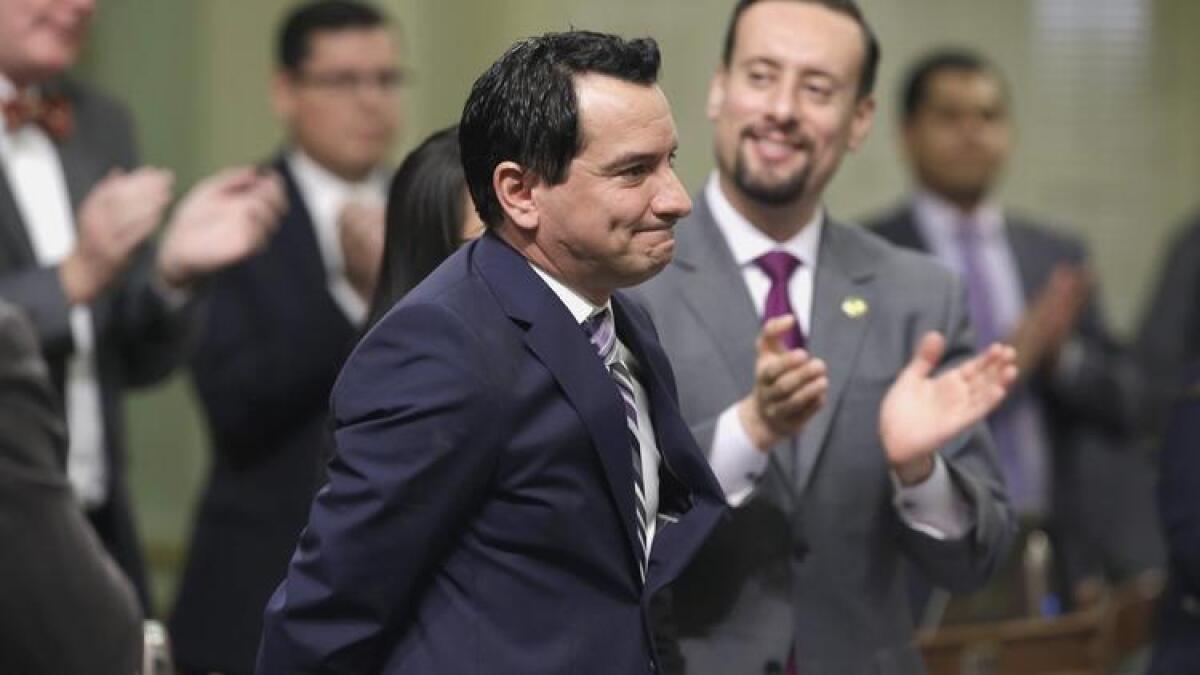
When Assemblyman Anthony Rendon (D-Lakewood) takes over as speaker in March, he’ll pick up a raft of new duties and responsibilities. But there’s one thing he won’t be doing: carrying his own legislation.
Rendon, in a meeting with The Times’ Sacramento bureau Wednesday, said he does not plan to author bills as speaker — a decision, he said, that is both “symbolic” and “functional.”
“It’s a new era. I want to empower [committee] chairs, I want to empower members,” Rendon said. “I want them to know that, to a large extent, the goal of the speaker is to make sure the caucus’ priorities get out.”
The move is a departure from those of recent legislative leaders. Current Speaker Toni Atkins (D-Los Angeles) has carried a number of bills, including last year’s law to close loopholes in the state’s ban on ivory sales and an unsuccessful proposal to increase affordable housing. Her predecessor, John A. Pérez (D-Los Angeles), authored legislation to expand Medi-Cal and create the Middle Class Scholarship fund.
Senate leaders also have put their name to major legislation. The sweeping climate change legislation carried by Senate Pro Tem Kevin de León (D-Los Angeles) set off the fiercest legislative battle in the Capitol last year.
Just because Rendon doesn’t plan to author any bills doesn’t mean he’ll refrain from arm-twisting — or “speakerizing” in Capitol parlance — to advance his policy priorities.
“If the speaker speakerizes a bill on the [Assembly] floor, that’s as impactful as whoever’s name is on top of it,” Rendon said. “I’m going to continue to make sure the good bills get off our floor.”
Local governments still tops in Sacramento lobbying
There may be bigger individual players in the world of lobbying in Sacramento, but when it comes to broad industry sectors, the most money spent to lobby state government comes from local government.
Cities, counties, special districts and their advocacy organizations are tops. In final numbers reported this week for 2015, the government sector accounted for $45.9 million in lobbying activity. That outpaces the health industry ($44 million), manufacturing ($22.6 million) and oil and gas companies ($22.4 million).
A closer look finds Los Angeles County as the biggest government spender lobbying in the first year of the legislative session, with total expenses of more than $1.5 million. The Metropolitan Water District of Southern California was close behind, at almost $1.4 million in lobbying costs.
Southern California actually accounted for the five highest amounts spent by government to lobby government. Rounding out the biggest players were San Diego County ($1.4 million), Orange County ($1.2 million) and the Los Angeles Department of Water and Power ($1.17 million).
A long way from Orange County
Assemblywoman Young Kim (R-Fullerton), left, accompanies Assemblyman James Gallagher (R-Nicolaus), second from left, in Northern California.
Democrats have almost four times as much cash as GOP
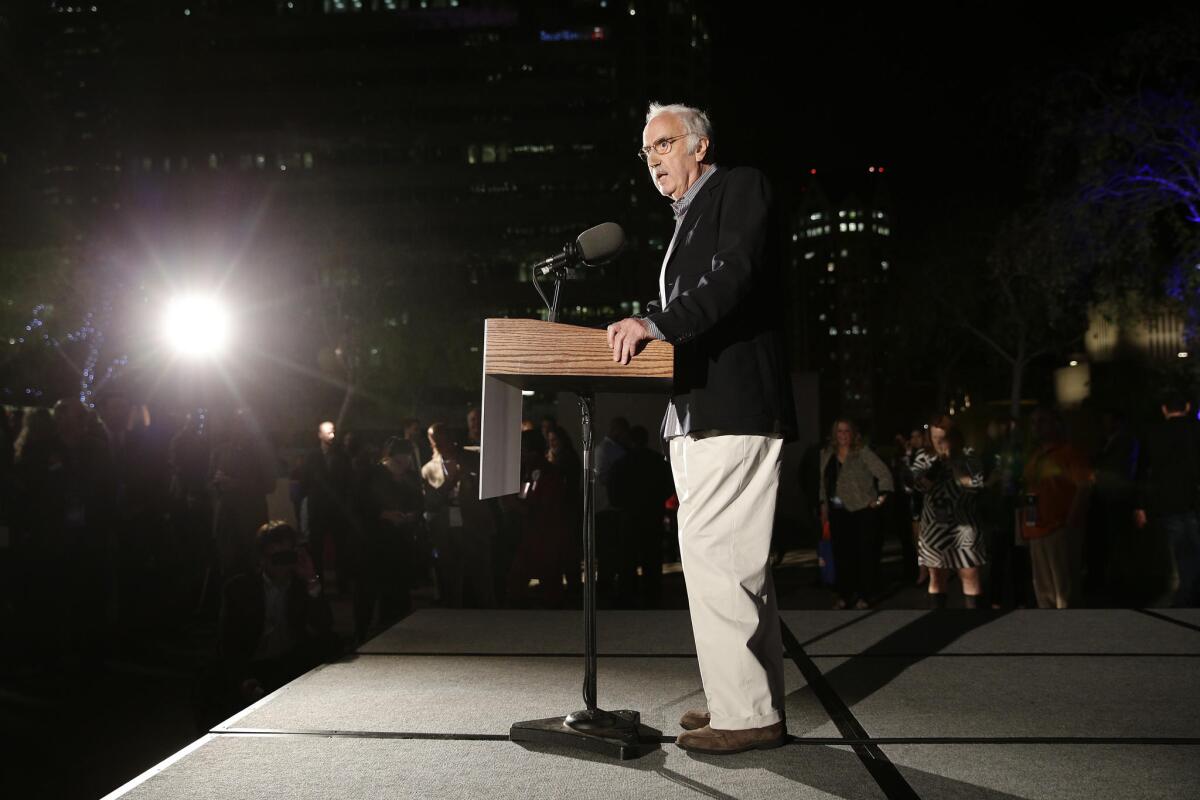
The latest campaign finance reports show that the money mismatch continues between the state’s two major political parties, as the California Democratic Party has almost four times as much cash for the year ahead as does the California Republican Party.
In newly filed documents, Democrats report raising more than $4.3 million in the last three months of 2015. They ended the year with some $13.3 million in the bank.
Republicans, meanwhile, raised only about $1.9 million in the final quarter of 2015, and reported $3.45 million of cash on hand as of Dec. 31.
While the numbers are another example of Democratic dominance, it’s worth noting that GOP finances are now much stronger than they were a few years ago. Just three months before selecting former state Sen. Jim Brulte as its chairman in March 2013, the state Republican Party reported only about $155,000 in cash on hand. Under Brulte’s leadership, the party has spent less on operations and narrowed its focus to target only a handful of key races.
Still, the disparity means Democrats have substantially more resources for legislative races across the state as the 2016 election cycle begins.
Moves in governor’s office
Knight files gas storage safety legislation
Reps. Steve Knight (R-Palmdale) and Brad Sherman (D-Porter Ranch) filed separate pieces of legislation Tuesday requiring the Department of Transportation to set safety standards for natural gas storage facilities.
The Department’s Pipeline Hazardous Materials Safety Administration (PHMSA) regulates transportation of natural gas and has the authority to regulate gas storage as well, but has mostly left that to state officials.
Knight said he expects his legislation to be heard by the House Committee on Transportation and Infrastructure later this month. President Obama and Vice President Biden assured Sherman last week that they would push the agency to issue the regulations without congressional action. Sherman said Tuesday that he filed the bill as a backup to their promise.
In the Federal Register Tuesday, the agency urged gas companies to use industry “best practices” to ensure storage facilities are safe.
Rep. Loretta Sanchez supports union measure to boost the minimum wage
California Teachers Assn. gives nod to Kamala Harris
Kamala Harris nabs endorsement for Senate bid
Gavin Newsom reports almost $8.4 million for 2018 governor’s race
For Lt. Gov. Gavin Newsom, 2015 was a year focused on getting out in front of the potential pack for a race still a long way away. And newly filed campaign reports show that effort included raising big bucks.
Newsom’s new filings show almost $8.4 million in cash on hand, with most of that in his 2018 gubernatorial campaign account and the rest in his 2014 reelection coffers.
Although none of the other potential high-profile challengers has officially declared interest in the race to succeed Gov. Jerry Brown, Newsom seems sure that they’re coming. Of the reported amount, $6 million was raised just in 2015, with Newsom’s efforts speeding up in the summer and fall months.
His declaration for the state’s top job came early in 2015, after he opted not to launch a campaign to replace Sen. Barbara Boxer.
It’s worth noting that Newsom is also raising money for at least one of the potential statewide ballot measures he’s endorsed for 2016. Last week, he sent an email to supporters promoting a contest for donors to his gun violence initiative -- with the winner getting two tickets to Sunday’s Super Bowl 50 in Santa Clara.
Sherman to file legislation to address Porter Ranch leak
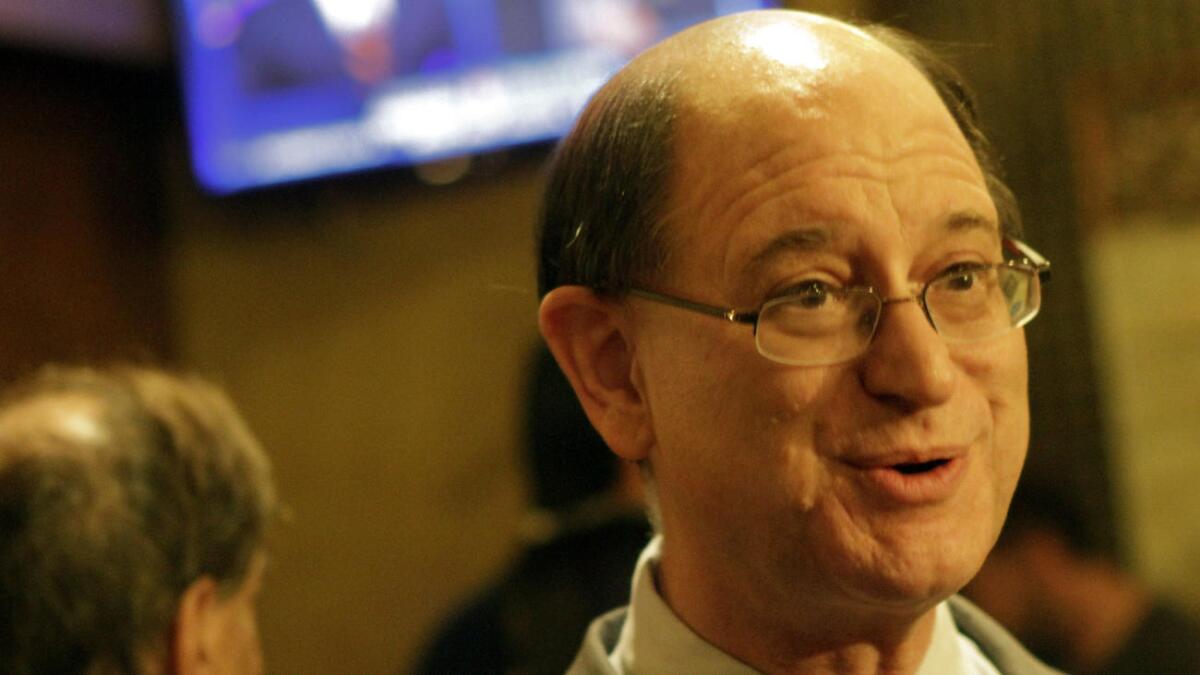
Rep. Brad Sherman (D-Porter Ranch) announced Tuesday he plans to file legislation ordering the Department of Transportation’s Pipeline Hazardous Materials Safety Administration (PHMSA) to set safety standards for natural gas storage facilities.
The agency regulates transportation of natural gas, and has the authority to regulate gas storage as well, but has left that to state officials.
Last week, Sherman elicited promises from President Obama and Vice President Joe Biden that they would push the agency to set storage rules. In a news release, Sherman called the bill, titled the Natural Gas Storage Safety Act, a backup measure.
“If PHMSA doesn’t adopt regulations using its existing authority, this bill would compel them to act,” he said. “State regulations are weak or non-existent. The Aliso Canyon disaster proves that we cannot leave oversight to the gas industry.”
Gas leaking from the Southern California Gas Co.’s Aliso Canyon Natural Gas Storage Facility for more than 100 days has forced approximately 3,000 Porter Ranch families from their homes.
June primary ballot poised to be shortest in 50 years
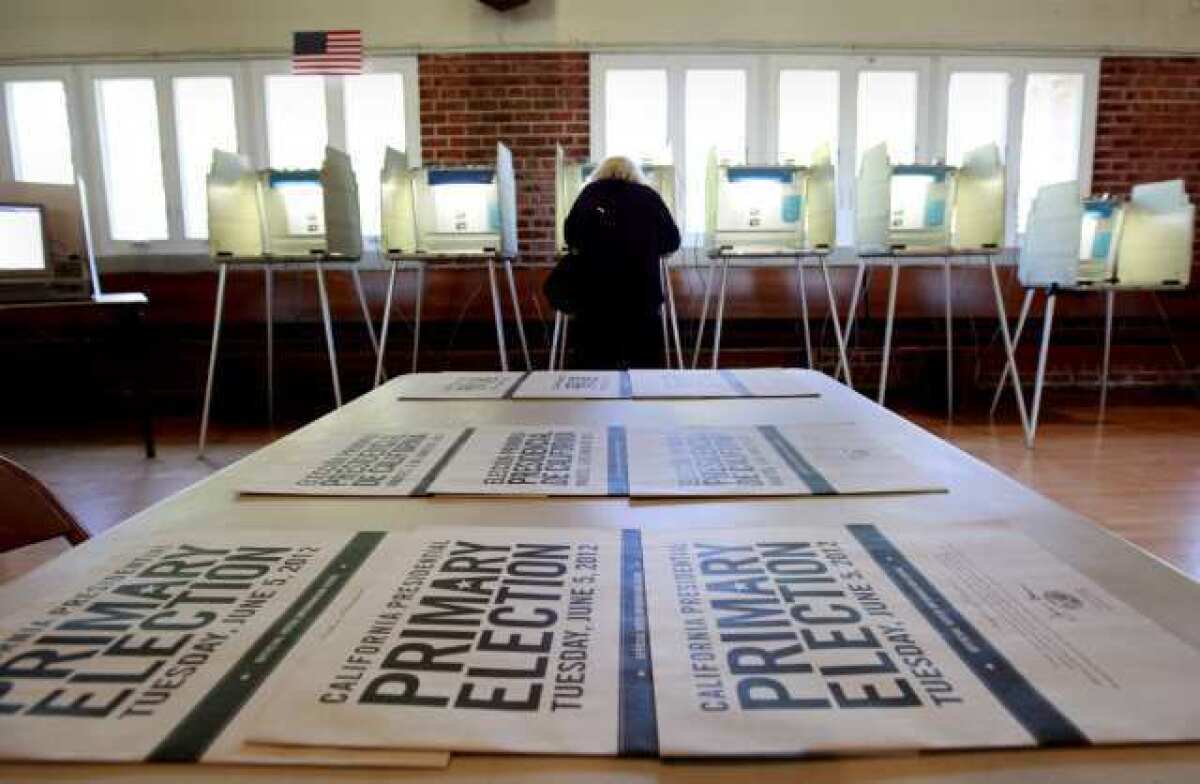
At this point, it won’t be hard to keep track of the measures on the June 7 statewide ballot.
That’s because there’s just one.
Secretary of State Alex Padilla assigned that single measure on Monday morning the number Proposition 50, a proposal placed on the ballot by the Legislature.
Prop. 50 would allow a ban any legislator suspended by his or her peers from being paid during the suspension.
The measure was created in 2014 in the wake of federal charges against former state Sen. Ron Calderon (D-Montebello). Calderon, who still awaits trial on those charges, took a leave of absence but was not docked pay because there was no provision for that action. Prop. 50 would change that system, and seems likely to win speedy approval by voters in June.
As to why it’s the only measure on the statewide primary ballot, you have to go back to 2011 and a law signed by Gov. Jerry Brown that moved all voter-circulated initiatives to fall, general-election ballots. Though Brown has urged legislators to place a statewide school bond on this year’s primary ballot, those odds of that seem long as a number of lawmakers have thrown their support behind an alternative school bond that’s already qualified for the November ballot.
A review of state records finds no primary election in California with fewer than two statewide propositions since June 7, 1966. As things stand, it will be a very lopsided election year, as November’s ballot could be the longest in a decade.
Campaign office sale helps fund Loretta Sanchez’s Senate run
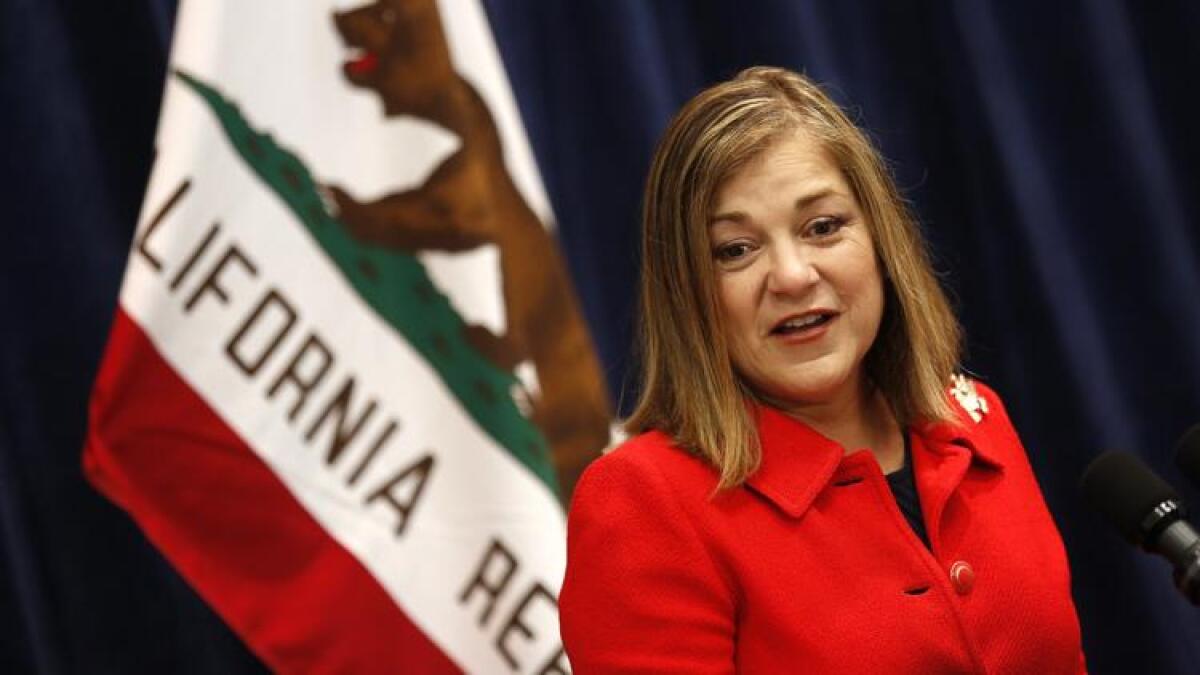
More than half of the $865,031 in campaign funds Orange County Rep. Loretta Sanchez raised for her Senate campaign during the last three months of 2015 came from the sale of her campaign office in Anaheim, federal elections records show.
Sanchez’s House campaign committee, Committee to Re-Elect Loretta Sanchez, had purchased the office in 2012 for $415,000 and sold it in November for $495,701. After the sale, Sanchez’s House committee transferred $475,000 to her Senate campaign.
“She had bought an office building because every two years she was running a campaign, so it was cost efficient,” said Sanchez campaign consultant Bill Carrick. “The reality is, starting one of these campaigns statewide is tough. We try to use every asset we have and be creative.”
The purchase and the sale were made by a limited liability corporation called 607 N. Anaheim – and Sanchez’s House campaign committee is the sole member of that entity, according to a campaign spokesman.
The $475,000 transfer comes on top of the $516,000 Sanchez transferred to her Senate campaign from her House campaign committee earlier in 2015.
Sanchez also has made a $300,000 personal loan to her Senate campaign.
The transfers and loan account for nearly $1.3 million of the $2.7 million Sanchez raised in 2015 for her Senate bid.
State doctors’ group backs marijuana legalization measure

The California Medical Assn., the influential trade group for the state’s doctors, announced its support Monday for a high-profile initiative to legalize recreational marijuana.
Dr. Steven Larson, the group’s president, said in a statement the organization believes the proposed initiative is a “comprehensive and thoughtfully constructed measure that will allow state officials to better protect public health by clarifying the role of physicians, controlling and regulating marijuana use by responsible adults and keeping it out of the hands of children.”
The ballot measure is backed by Lt. Gov. Gavin Newsom and financed in part by former Facebook executive Sean Parker.
The news release touting the group’s endorsement notes the group does not endorse marijuana use. But the group has pushed for legalization as far back as 2011, in order to foster more clinical research.
“Medical marijuana should be strictly regulated like medicine to ensure safe and appropriate use by patients with legitimate health conditions and adult-use marijuana should be regulated like alcohol,” Larson said. “This measure – along with the recently-passed medical marijuana bills -- will ensure the state of California does both – while keeping the public health and public interest as paramount concerns.”
Proponents of the measure are currently collecting signatures to qualify for the November ballot.
Negotiated truce in 2016 ballot wars could be tough
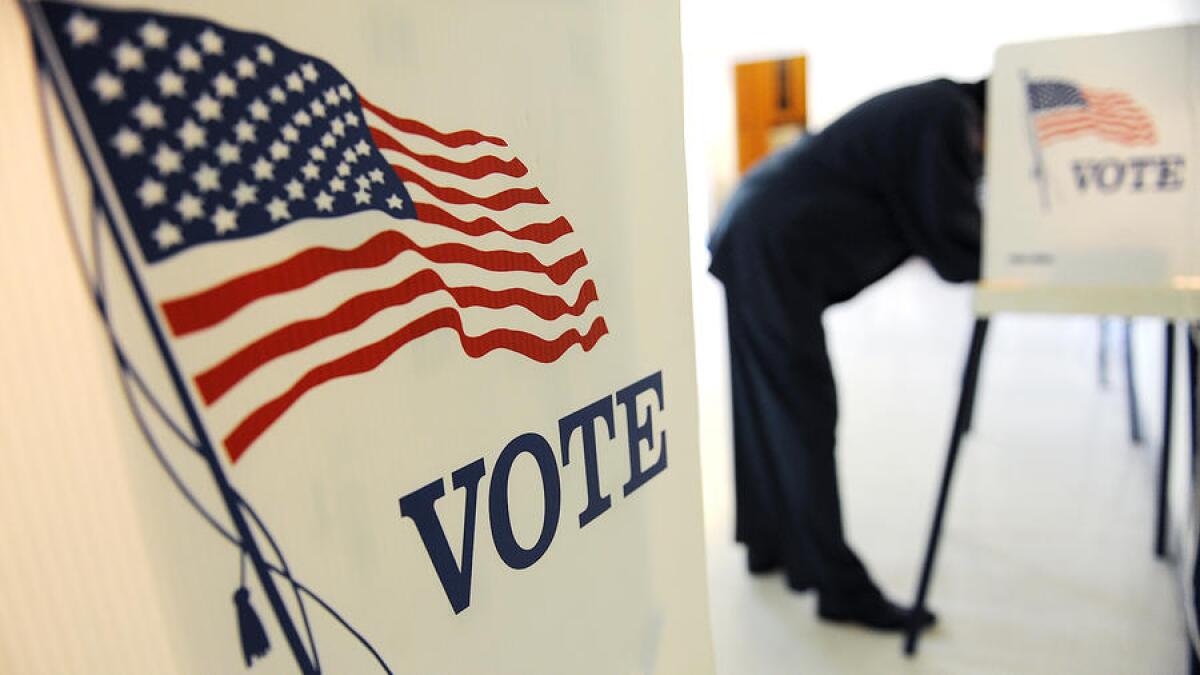
When Gov. Jerry Brown signed an overhaul of California’s initiative process into law in 2014, it was heralded for offering new incentives for compromise, not costly clashes on the ballot.
Now, after the law has been in place for more than a year, those kinds of deals seem much easier said than done in Sacramento.
The November ballot is shaping up to be one of the longest in more than a decade. And neither legislators nor ballot measure groups seem engaged on efforts to find middle ground.
Haves and have nots in California Senate race
Dragging tax negotiations keep assisted-death law in limbo
The grinding negotiations to find a new way to tax health plans to pay for Medi-Cal have had an unintended consequence: delay in implementing the state’s landmark assisted-death law, signed by Gov. Jerry Brown last year but kept from taking effect because it was passed in a special legislative session on healthcare.
Until that special session is adjourned -- which may not happen until a deal is struck on the tax negotiations -- the aid-in-dying law waits in limbo.
“Until the End of Life Option Act has an effective date, some Californians will die with needless pain and suffering,” said Toni Broaddus, California campaign director for the group Compassion & Choices. “It’s frustrating knowing that many of the folks who advocated for this law may not be able to take advantage of it when they need to.”
Initially, including their measure in the healthcare special session benefited the advocates.
Broaddus said the new law would not likely have been approved if it had not been part of a special session, which allows different procedural rules that helped overcome early opposition in the Legislature.
The governor signed the aid-in-dying law in October, and it is to take effect 90 days after the adjournment of the special session on healthcare.
The Legislature has the authority to close the special session and continue the tax negotiations in the regular budget process. But so far, legislative leaders have no plans to do so.
John Casey, a spokesman for Assembly Speaker Toni Atkins (D-San Diego), said the speaker “remains committed to seeing the [assisted-death] law enacted.”
“That being said, the primary focus of the special session was to find agreement on extending a healthcare tax and to provide additional funding for individuals with developmental disabilities,” he said. “It is the speaker’s hope that agreement can be reached soon and the session can be closed.”
Staff writer Melanie Mason contributed to this report.
Chavez trails Democrats — by a lot
Senate campaign fundraising numbers are in
California’s grassroots Democrats make their picks for Congress
Local delegates for the California Democratic Party gathered up and down the state to cast votes in pre-endorsement conferences for candidates ahead of the June primary.
A candidate needs the vote of at least 70% of their district delegates for their endorsement to be placed on the party’s consent calendar at the convention - all but guaranteeing an endorsement from the party.
If a candidate doesn’t reach the 70% threshold but gets at least 50% of the vote, the decision is made on the floor of the state party convention in San Jose next month.
Inside baseball? You bet.
But the results are a good sign of where races stand:
- 17th Congressional District: Rep. Mike Honda got 58 votes; Ro Khanna received 15 votes; and 13 delegates voted for no endorsement. That endorsement will be decided at a convention caucus.
- 21st District: Fowler City Councilman Daniel T. Parra got 46 votes; Bakersfield lawyer Emilio Huerta got 9; and 1 person voted for no endorsement. Huerta, who entered the race in January, said his campaign would file an objection to send the endorsement to the floor of the state convention. He said some delegates had already voted by mail for Parra before he got in the race.
- 24th District: Santa Barbara County Supervisor Salud Carbajal received 95 votes; Santa Barbara Mayor Helene Schneider got 11 votes; and there were 9 votes for no endorsement. Carbajal will be on consent calendar. The seat is currently held by retiring Rep. Lois Capps.
- 25th District: LAPD Lt. Lou Vince cleared 70% of delegate votes with 41; attorney Bryan Caforio got 6 votes; and 3 voted for no endorsement. The two are hoping to unseat Rep. Steve Knight (R-Lancaster).
- 32nd District: Rep. Grace Napolitano (D-Norwalk) got 33 votes; Assemblyman Roger Hernandez (D-West Covina) got 19 votes; and one person voted no endorsement. Hernandez, who will leave his seat in the Assembly next year because of term limits, is challenging the 79-year-old nine-term congresswoman.
- 44th District: State Sen. Isadore Hall (D-Compton) got all 70 votes. Rep. Janice Hahn (D-San Pedro) is leaving the seat to run for L.A. County Supervisor Don Knabe’s seat. A party official said candidate Nanette Barragan did not file to be a part of the vote.
- 46th District: Former state Sen. Joe Dunn got 15 votes. Former state Sen. Lou Correa got 17 votes, and 11 delegates voted for no endorsement. Since no candidate got to 50% of the vote, there will be no primary endorsement in the race.
Prison plan and more in this week’s podcast
Gov. Jerry Brown’s announcement of a ballot measure to revamp prisoner parole and juvenile trials may easily be the week’s biggest policy and political story in the Golden State.
On this episode of the California Politics Podcast, we discuss the ramifications of the governor’s sweeping plan. We also look at the political truce called in the race for a San Diego state Senate seat, and the accusations lodged against members of the California Coastal Commission over the potential removal of the panel’s top staffer.
You can subscribe to the podcast free on iTunes. And a note: be sure to catch an inaugural episode of a new podcast focused on the presidential sweepstakes. That’s coming next week.
Brown’s top advisor collects consulting fees from Democratic Party
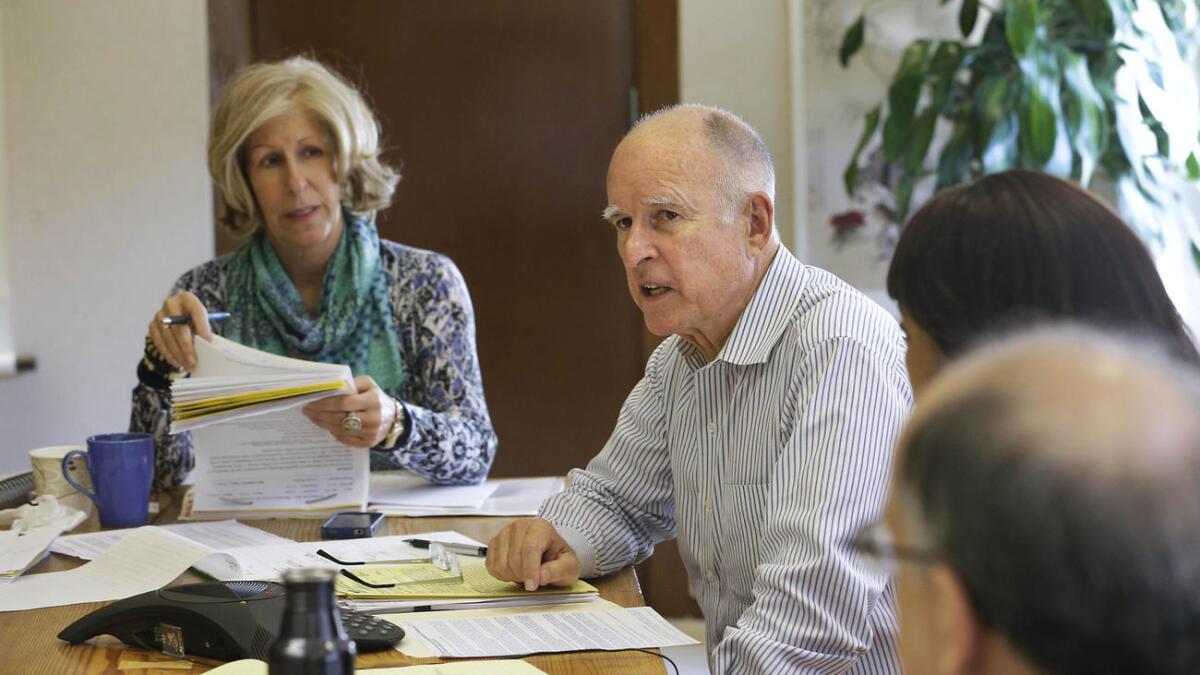
Gov. Jerry Brown’s chief advisor, Nancy McFadden, was paid $81,500 by the California Democratic Party in 2015 to consult on campaigns, payments on top of her government salary.
Party officials did not disclose any specifics about the consulting work done by McFadden, who the party paid $54,500 in June and $4,500 a month for the rest of the year, according to state campaign finance records.
“Nancy provides lots of good counsel, all on her own time. Best deal in town,” said Michael Soller, spokesman for the California Democratic Party.
McFadden was not available for comment on Friday. She serves as the governor’s executive secretary, a role akin to a chief of staff, and according to the governor’s office is paid $188,436 annually.
“As for her work with the California Democratic Party, she did general consulting for them on a variety of issues all on her own time,” said Deborah Hoffman, spokeswoman for the governor.
It is not uncommon for staff members of elected officials to work for, and be compensated, for their boss’ political campaigns on their own time.
McFadden had not received any prior compensation from the party or from Brown’s gubernatorial campaigns since he ran for governor in 2010, according to state elections records.
This post was corrected Sunday at 3:45 p.m. It was originally published Friday at 5 p.m. The earlier version incorrectly stated that McFadden received $5,400 in monthly payments.
Republican George ‘Duf’ Sundheim collects $300,000 for his California Senate bid
Follow along with us: Local party endorsement conferences
Local Democratic activists this weekend will be voting at pre-endorsement conferences around the state ahead of the California Democratic Party’s convention in February.
The conferences will be early tests of local support for some intra-party races, including the re-match between Rep. Mike Honda (D-San Jose) and fellow Democrat Ro Khanna.
Rep. Ami Bera (D-Elk Grove) and Rep. Grace Napolitano, who is being challenged by Assemblyman Roger Hernandez (D-West Covina), also face conferences.
A candidates needs the vote at least 70% of their district delegates for their endorsement to be placed on the party’s consent calendar at the convention.
If a candidate doesn’t reach the 70% threshold but gets at least 50% of the vote the decision is made on the floor of the state party convention in San Jose next month.
Follow along as we tweet the results and sign up for our Essential Politics newsletter to read more on Monday.
Kamala Harris reports raising $7.9 million in 2015 for Senate campaign
California Democratic Party rakes in the dough
California has more than $1 billion in cap and trade funds just waiting to be spent

When budget negotiations were in danger of stalling last year, Gov. Jerry Brown and state lawmakers put off deciding how to spend more than $1 billion in funds collected from the auction of greenhouse gas pollution credits.
At the time, Brown said he expected a compromise “fairly expeditiously in the next few days or weeks.”
Seven months later, a deal remains elusive.
The money has been sitting unspent in the state’s Greenhouse Gas Reduction Fund.
By law, it has to be used on programs to cut emissions — 60% is earmarked to pay for construction of a high-speed rail line, affordable housing and other transportation programs. That portion already is being spent.
But the rest of it — about $1.6 billion — can’t be doled out until legislators and the governor agree on how it should be spent.
In the meantime, environmentalists say key programs could be at risk. The state’s electric vehicle rebate program, for example, could run out of funds in April unless Brown and the Legislature sign off on new spending.
Dispatch from Steyer’s private meeting with Democrats
California billionaire environmentalist Tom Steyer told House Democrats on Friday that Republican presidential candidates don’t understand the severity of climate change, according to a source in the closed-door meeting.
“I listen to Marco Rubio and all of the Republican candidates say we can’t afford to address this problem. They have not done their homework,” he said at the group’s retreat in Baltimore, according to a person in the room.
Steyer told Democrats to think about climate change as a race between human ingenuity and changes in the natural world, reminding them that 2015 was the hottest year on record.
“Although we’re doing really well on policy, politically... we’re in a race. It’s not a race we can be complacent about,” he said.
Steyer is an influential political donor and could run for governor in 2018.
Steyer’s comments came on the last day of the House Democratic Caucus’ policy retreat. House Democrats also heard from California education entrepreneur and Khan Academy founder Salman Khan and Daily Show host Trevor Noah.
Rep. Xavier Becerra (Los Angeles), the caucus chairman, confirmed Steyer’s comments and said in a statement after the meeting that “the American people are no longer debating the science, they now want to know the solutions.”
President Obama pledges national gas storage safety standards
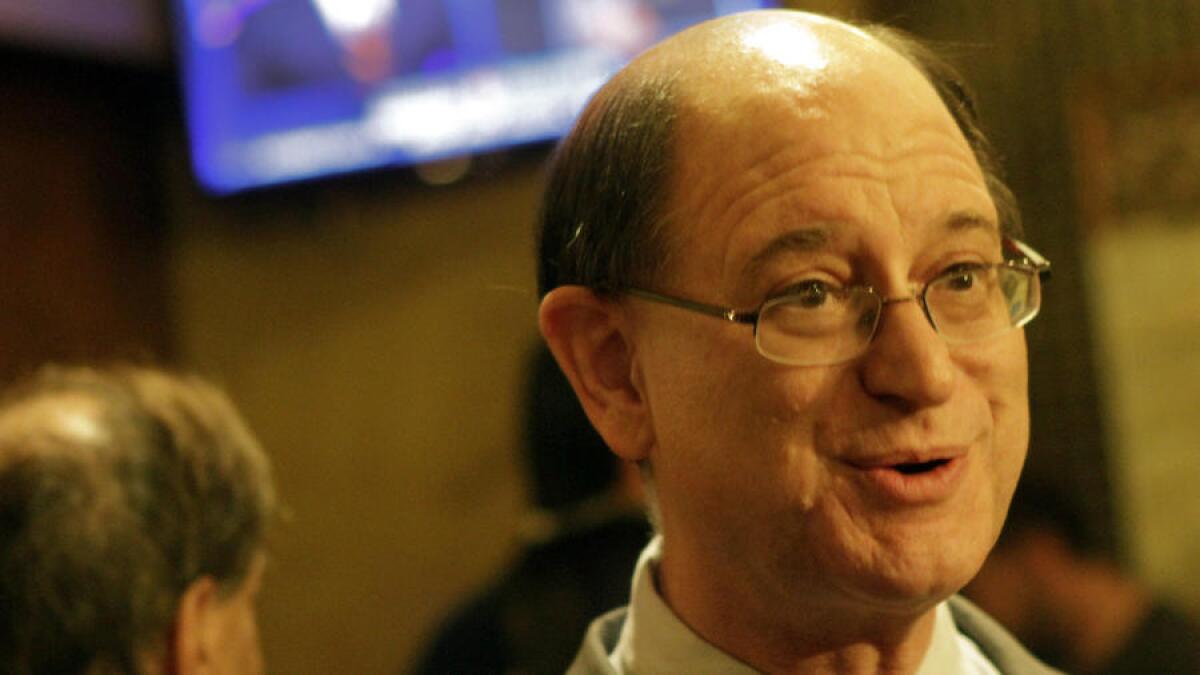
President Obama told House Democrats Thursday that his staff will push gas regulators to set national gas storage safety standards, according to Rep. Brad Sherman (D-Porter Ranch).
The Department of Transportation’s Pipeline and Hazardous Materials Safety Administration (PHMSA), has the authority to regulate natural gas storage safety standards, but has left regulation of most storage facilities, including Aliso Canyon, to state regulators.
The issue is at the forefront of Sherman’s mind. Gas has leaked from Southern California Gas Company’s Aliso Canyon Natural Gas Storage Facility in his district for nearly 100 days. The leak has forced some 3,000 Porter Ranch families from their homes.
Sherman said Obama made the commitment while answering questions from House Democrats after a speech Thursday at their annual policy retreat in Baltimore. The president reiterated it when he spoke to Sherman briefly afterward, the congressman said by phone later.
“Somebody has got to call PHMSA and say “we’re going to write these regulations... and it’s going to be done in a year,” Sherman said.
He said since the agency already has authority to write the regulation, the president can easily prompt action.
“You don’t need to have a Congress to force PHMSA to use their power if you have a president to tell them to,” Sherman said.
Top state leaders talk income inequality, “tale of two Californias”
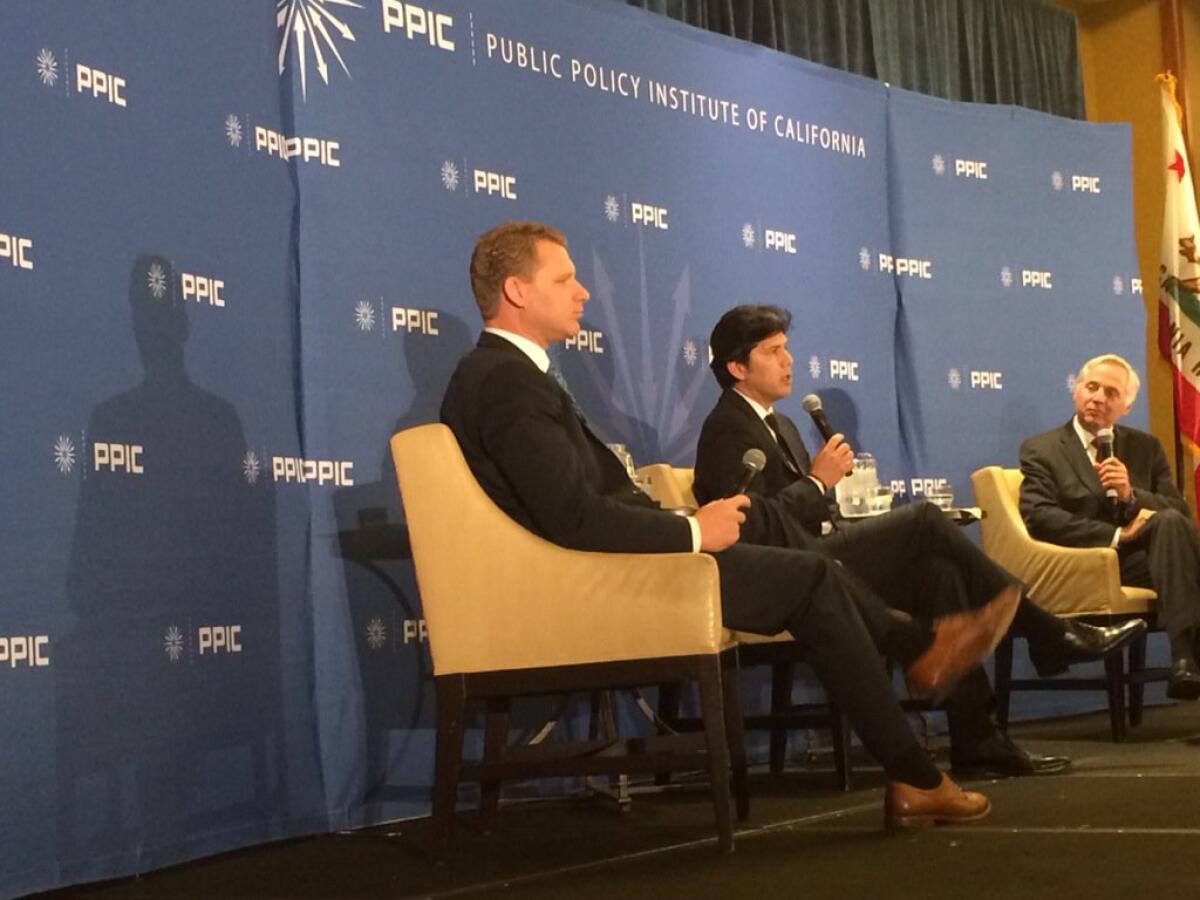
Assembly Minority Leader Chad Mayes (R-Yucca Valley) and Senate Pro Tem Kevin de León (D-Los Angeles) agreed Thursday that income inequality is among the most pressing issues facing California.
“Parts of the state are enjoying really robust economic growth, but other parts of the state have not yet benefited,” de León said at the latest installment of the Public Policy Institute of California’s Speaker Series in downtown Sacramento.
Mayes, who became leader of the Assembly Republicans earlier this month, called it a “tale of two Californias.”
“Drive up [Highway] 1, you’ll say, ‘Wow...people are doing really well here in California,’” Mayes said. But in areas like the Central Valley and the Inland Empire, which Mayes represents, “People are struggling to get by,” he said, adding that he believes policies coming from Sacramento are contributing to the problem.
Mayes went on to say that reducing regulation and focusing on the housing crisis will go a long way to helping hard-hit areas get back on their feet.
“I care about increasing the human condition, but the way I think that we can do that is different than [de León],” Mayes said.
Being bipartisan in California
A bipartisan duo of state lawmakers decried what they called the “demagoguery” playing out on the national political stage Thursday.
Democratic Senate Pro Tem Kevin de León and Republican Asm. Chad Mayes came together at a luncheon hosted by the Public Policy Institute of California and resolved to work across party lines to solve some of California’s thorniest issues.
“We’ve seen a lot of bigotry, we’ve seen a lot of comments that have no place in the political arena, especially during a presidential election,” de León said.
Mayes, who broke party ranks to second the nomination of incoming Speaker Anthony Rendon earlier this month, said it signals a new era of cooperation between California’s parties.
“I was proud to stand up and say it’s time for a change in California,” Mayes said. “This may come as a shock, but I like Kevin, I like Anthony. They’re wrong, but I like them. And I want to be able to work with them.”
Mayes called on California’s politicians to “forget about the demagoguery that’s happening at the national level.”
“It’s disturbing and disgusting to me, quite frankly,” he said.
De León noted the “internal combustion” going on within the ranks of the Republican Party and called on California’s leaders to do better.
“We’re not going to agree, obviously, on a lot of things,” de León continued. “But if we can get some real, tangible victories for Californians...we can stay above the fold and not be mired with this national discourse. We’re doing things very differently here in the state of California.”
GOP Assemblyman heads to Iowa to boost Ted Cruz
Harper, a first-term legislator, is from Huntington Beach.
Biden pledges to help with pipeline safety after Porter Ranch leak
Vice President Biden agreed Thursday to work with Rep. Brad Sherman (D-Porter Ranch) to write new national natural gas storage safety standards in the wake of the Porter Ranch gas leak.
The Department of Transportation’s Pipeline and Hazardous Materials Safety Administration (PHMSA), has the authority to regulate natural gas storage safety standards, but has left regulation of most storage facilities, including Aliso Canyon, to state regulators.
“The Porter Ranch gas leak, the largest in U.S. history, occurred due to negligent operations,” Sherman said in a statement. “But apparently SoCalGas complied with the weak state regulations and nonexistent federal regulatory efforts. We do not want to see another massive gas leak in future – in Aliso Canyon or anywhere in the nation.”
The commitment came when Biden spoke at the House Democratic Caucus’ three day policy conference in Baltimore Thursday.
Biden’s speech to House Democrats focused on cancer research, and a new “moonshot” effort to find a cure that President Obama announced Biden would lead in his State of the Union speech earlier this month.
The policy retreat is scheduled to end Friday after members hear from California billionaire environmentalist Tom Steyer.
Atkins: Block’s decision came as a surprise
De León on Block: “A quintessential public servant”
In the wake of news that Democratic Sen. Marty Block will not seek re-election, thus avoiding a testy intraparty contest against fellow San Diegan Speaker Toni Atkins, Senate leader Kevin de León heaped praise on his Senate colleague.
In a statement, de León said Block “has not been only an ally and friend, but a quintessential public servant who has humbly devoted his life to improving the lives of others.”
De León was particularly laudatory of Block’s work on higher education.
“Thousands of future leaders who achieve the dream of a quality education in California will have Marty Block to thank,” he said.
Assembly, on double diaper duty, OKs two measures to reduce costs
The Assembly also approved a second bill by Gonzalez, a Democrat from San Diego, that would provide a $50 per month diaper benefit for welfare recipients whose children are also enrolled in child care. That bill passed on a 60-5 vote.
Both measures now head to the state Senate.
Block retiring: Democrats avoid intraparty battle
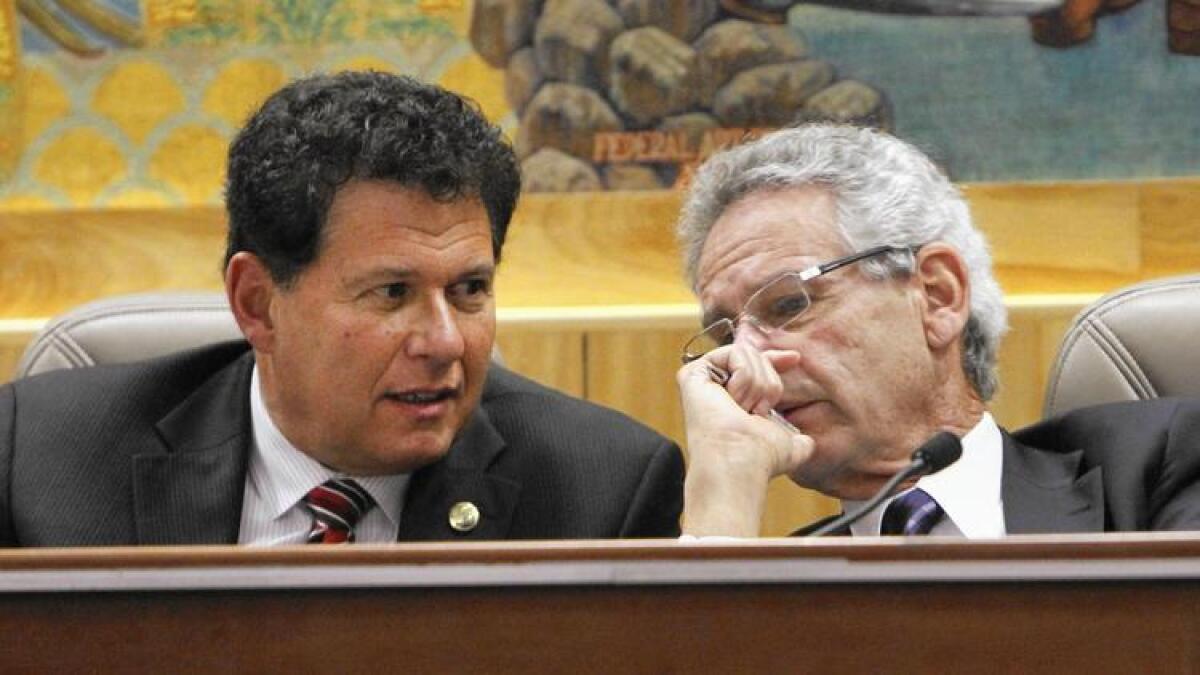
State Sen. Marty Block of San Diego surprised his colleagues by announcing Thursday that he would not seek reelection, sparing the Democratic Party a contentious battle that started brewing last fall when Toni Atkins, the state Assembly speaker, announced that she would run for his seat.
Block’s Senate floor announcement came shortly after the California Nurses Assn. endorsed Atkins in the race to represent the 39th Senate District.
Block said he decided not to run for re-election this year to avoid unnecessary intraparty fighting that would use up resources better put into competitive races against Republicans.
In an interview with the Times, Block said he reached the decision after he and Atkins squared off in three debates last week in San Diego.
“While we were debating, it became infinitely clear that we both believe in the same things, we both have the same progressive agenda,” Block said. “It just made it seem much smarter that we could do a much better job of moving ahead our agendas by working together than fighting.”
Block, 65, said he has no interest in another elected office. But given he is a former professor and dean at San Diego State University, he would “definitely” be interested in that field, possibly as an appointment as a college chancellor.
Block’s decision to back out was praised by California Democratic Party Chairman John Burton. “Avoiding expensive endorsement battles when we have two highly qualified and progressive candidates in the race helps all Democrats win on Election Day,” Burton said.
The senator surprised some colleagues with his announcement.
“I’ve decided instead to pursue other opportunities,” Block said on the floor Thursday morning. “I have greatly enjoyed every moment on the Senate floor and before that the Assembly. Having said that, change is always a pretty good thing and I am looking forward to what lies ahead.”
Atkins decided against running against Block in 2012 and said this bid came because he had indicated he would serve only one term.
Atkins had recently won some big endorsements from figures including Secretary of State Alex Padilla, who called her “a trailblazer and a leader who is committed to greater community participation in our government.”
Block was elected to the Assembly in 2008 before winning the Senate seat in 2012.
Atkins, in an interview with the Times, said the race against a fellow Democrat could be trying.
“When you both want to serve, you both feel like you have a lot to give, and yet you are really similar in a lot of respects...[it was] difficult on both of us personally, she said.
With the prospects of a bruising rivalry behind her, she said there was still much to focus on--both in the Capitol and securing a win in the Democratic-leaning seat in November.
“The plate was full before. The plate continues to be full,” she said.
This post has been updated with remarks from Atkins. Melanie Mason contributed to this report.
California-based AAPI PAC endorses Clinton
A San Francisco-based Asian American and Pacific Islander political action committee endorsed Democratic presidential candidate Hillary Clinton Thursday, saying she’s done more to connect with AAPI voters than any other candidate.
The group, CAPA21, is named after the country’s first national Asian American PAC, the Coalition of Asian Pacific Americans, which closed in 2008.
The group praised Clinton’s outreach to the AAPI community, including appointing AAPI’s to major campaign roles, creating the Asian Americans and Pacific Islanders for Hillary Leadership Council, and holding APPI specific campaign events.
Pelosi raises $40 million for 2016 House Dems so far
House Minority Leader Nancy Pelosi (D-San Francisco) raised $40.1 million for House Democrats this election cycle, the campaign party arm for House Democrats announced Thursday.
According to the Democratic Congressional Campaign Committee, $30.4 million goes directly to the committee. A prolific fundraiser since joining leadership in 2002, Pelosi held 205 fundraising events in 35 cities last year, the DCCC said.
Pelosi has raised $468.9 million for Democrats since 2002, the committee said.
California Democrats lead policy conference
California’s top Democrats kicked off the House Democrats’ policy retreat in Baltimore on Wednesday afternoon, saying Congress shouldn’t be drowned out by the 2016 presidential election.
“Democrats in the House are gathering because we think it’s important for us to let people know 2016 is not going to be a lost year in the House of Representatives or in Congress,” said Caucus Chairman Xavier Becerra (D-Los Angeles). “If we have anything to do with it, we’re going to get a lot of stuff done.”
House Minority Leader Nancy Pelosi (D-San Francisco) said members will discuss criminal justice reform, national security and providing more opportunity in Baltimore. They also plan talks about college costs, immigration and gun control.
House Speaker Paul Ryan (R-Wis.) has characterized Republican goals this year as uniting the party in the months before election.
California billionaire environmentalist Tom Steyer is scheduled to speak to the group Friday about climate change and the environment.
Members also were to hear from President Obama and Vice President Joe Biden, along with California education entrepreneur and Khan Academy founder Salman Khan and Daily Show host Trevor Noah.
New support for GOP hopeful
Brown to take prison sentencing issue to November ballot
Gov. Jerry Brown will introduce on a 1 p.m. conference call his proposal to return California to a system in which judges and parole boards have much more discretion.
Here’s our story detailing what Brown has in mind.
Measure to increase disclosure in campaign ads moves ahead
A bill that aims to provide more transparency about who’s paying for campaign advertisements cleared the Assembly on Wednesday.
The measure, by Assemblymen Jimmy Gomez (D-Los Angeles) and Marc Levine (D-San Rafael), would require campaigns to clearly disclose the major funders behind ads.
Because the bill would change the Political Reform Act, it required a two-thirds vote. It passed narrowly with 55 votes, including some Republicans:
The measure now moves to the Senate.
Assembly clears bill mandating double pay on Thanksgiving for large retailers
A proposal to require large retailers to pay their employees double when they work on Thanksgiving squeaked through the state Assembly on Wednesday.
After the bill failed last summer, Assemblywoman Lorena Gonzalez (D-San Diego) hemmed in her proposal to make it apply only to grocers and retailers with more than 500 employees.
Gonzalez, in her closing remarks, appealed to the values of her colleagues.
Thanksgiving is a day “which we have said as a country should be a holiday, a day for family,” she said. “And yet every single Thanksgiving we see more and more retailers opening up and requiring, at the threat of losing your job, that you show up to work.”
But opponents of the measure said it would unfairly harm employers.
Even with the revisions, “It’s still a narrowly tailored bad bill,” said Assemblyman Matthew Harper (R-Huntington Beach).
The measure passed with a bare majority of 41 votes and now heads to the Senate. Gonzalez was able to pick up some Democrats who were previously against the legislation. Some business-aligned Democrats including Adam Gray of Merced and Mike Gipson of Carson voted in favor of the bill.
California Senate acts to keep cop killers from getting medical parole
The state Senate on Wednesday acted to plug a loophole to prevent those convicted of killing a law enforcement officer from being eligible for early release because of significant health problems.
Sen. Cathleen Galgiani (D-Stockton) said cop killers are generally disqualified, but some were convicted in the 1970s when they were eligible for parole.
“An act of aggression against a law enforcement officer is an act of aggression against the very system meant to keep us safe,” Galgiani told her colleagues.
SB 6 applies to the state’s medical parole program that allows the early release of convicts with six months or less to live and do not pose a threat to public safety because they are incapacitated.
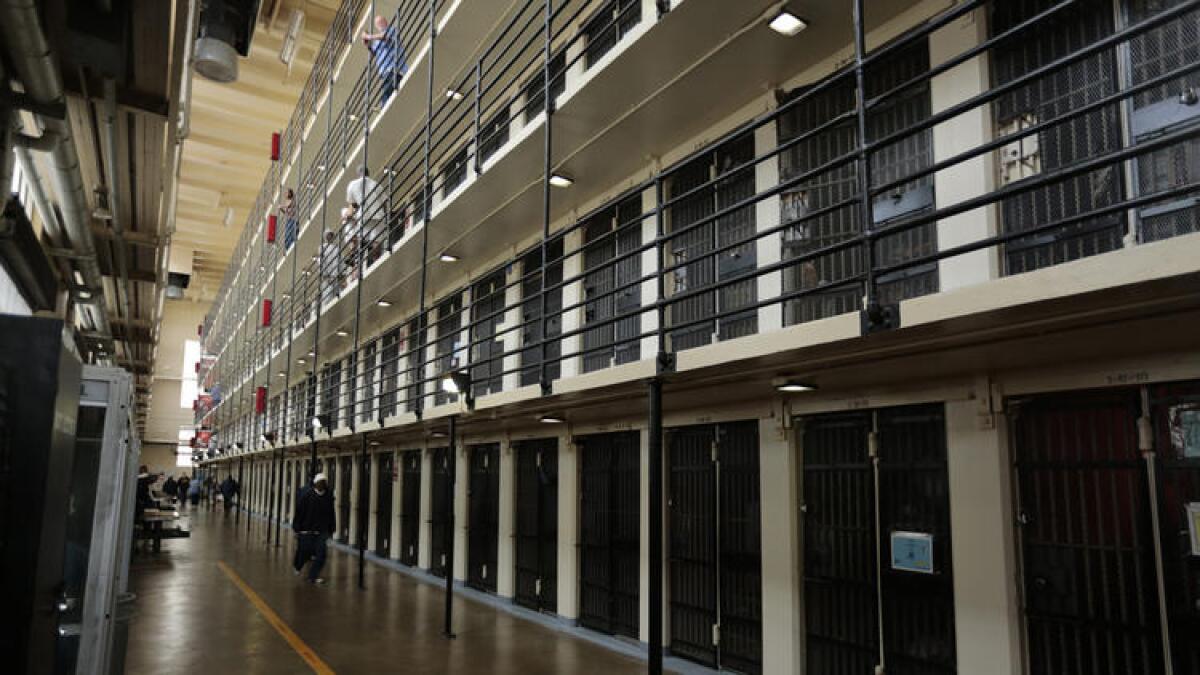
Charter bus safety measure approved by state Senate after fatal Orland crash
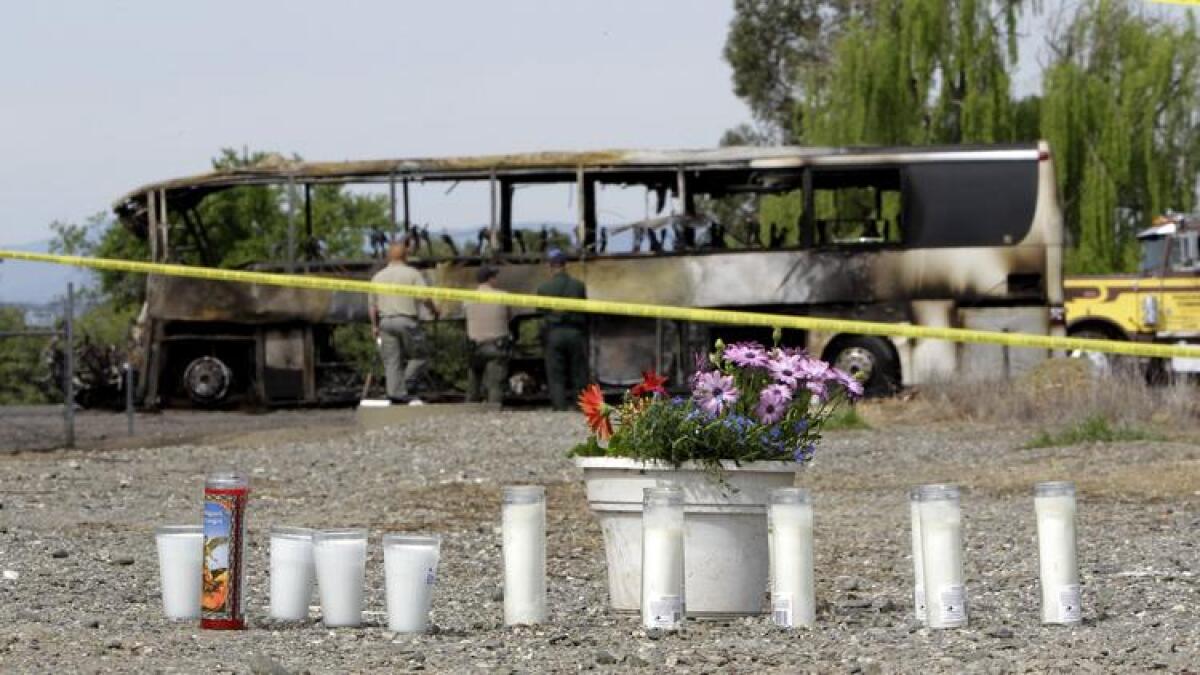
Charter buses operating in California would have to be equipped with more safety features, including a second door, under a bill approved Wednesday by the state Senate.
The measure, which now heads to the state Assembly for consideration, was in response to an April 2014 accident in Northern California that killed 10 people. A FedEx truck veered across Interstate 5 near Orland and hit a bus carrying Los Angeles students heading to an orientation at Humboldt State University.
Some students said they had a hard time getting off the bus as it caught fire and filled with smoke.
“If these provisions had been in effect, many more people would have survived the accident,” said Sen. Ricardo Lara (D-Bell Gardens), who authored the bill. It would require charter bus drivers to instruct passengers on exit locations and operation as well as require all buses to be equipped with emergency features, including burn-resistant materials, starting as early as July 1, 2017. Buses built after that would have to have a second door.
Sen. Ted Gaines of Rocklin was one of several Republicans to abstain from voting. Gaines said he is concerned about the high cost of the retrofits, which he said could mean millions of dollars in expenses for some operators.
‘Modern Family’ star, LGBT rights champions among hosts of Harris fundraiser

David Cooley, owner of West Hollywood’s iconic gay bar the Abbey, is hosting an A-list Senate campaign fundraiser tonight for Democratic state Atty. Gen. Kamala Harris.
Attendees at the Hancock Park event will be forking over contributions that range from $250 to $2,700 apiece, according to an invitation to the event.
Other hosts for the fundraiser include: Beverly Hills philanthropist and tech entrepreneur David Bohnett; actor Jesse Tyler Ferguson of “Modern Family” and his husband, Justin Mikita; Los Angeles County Supervisor Sheila Kuehl; Susan LaVaccare, a founding member of the Los Angeles County Lesbian and Bisexual Women’s Health Collaborative; philanthropists Dr. Bill Resnick and Michael Stubbs; and attorney Dana Perlman and his husband, Hugh Kinsellagh.
Harris, the former San Francisco District Attorney, is running for the Senate seat being vacated by the retiring Barbara Boxer. Her top Democratic rival is Rep. Loretta Sanchez of Orange. The Republicans running include Assemblyman Rocky Chavez of Oceanside, George “Duf” Sundheim and Tom Del Becarro. Both Sundheim and Del Becarro are former chairmen of the California Republican Party.
Board of Equalization backs bills on ‘tampon tax’ and marijuana tax payments

California’s state Board of Equalization voted Tuesday to support two controversial bills that would affect how taxes are collected on medical marijuana and feminine hygiene products.
The board voted 4 to 0 in support of AB 1561, which would make tampons and other feminine hygiene products exempt from sales tax. The bill’s sponsors, Assemblywoman Ling Ling Chang (R-Diamond Bar) and Assemblywoman Cristina Garcia (D-Bell Gardens), have characterized the tax as a “gender injustice.”
“Effectively we are being taxed for being born as women,” Garcia said in a statement. Proponents have pointed out that state law already exempts certain items such as walkers and prescription medication, including Viagra. Garcia called it an “outdated tax that uniquely targets women for a function of their body.”
The board also voted to endorse a bill by Assemblyman Mike Gipson (D-Carson) that would allow medical marijuana dispensaries to make their state tax payments in cash without penalty. This has been an issue for dispensaries that have limited access to banking due to federal drug laws.
AB 567, another bill by Gipson that would create a limited amnesty program to encourage medical marijuana businesses to bring their state taxes up to date, received the board’s blessing as well. Gipson has said the amnesty program would allow the industry to contribute its share to education, healthcare and other public programs.
The board’s votes are not binding and the bills must still pass both houses of the Legislature and receive the governor’s signature.
$74 billion for retired public worker healthcare, says controller
The cost to state taxpayers for health and dental benefits already earned by public sector workers grew by last summer to $74.1-billion, an expense that state officials largely have no plan to ultimately pay.
The new estimate by state Controller Betty Yee is slightly smaller than expected for the fiscal year ending June 30. Even so, the total obligation is $2.38-billion larger than last year’s estimate.
“California has a duty to ensure it can meet obligations to workers who earned these retirement benefits,” said Yee in a written statement.
Gov. Jerry Brown has been pushing for retiree healthcare needs to be covered as part of new contracts with public employee unions. Unlike cash pension payments, the state has used a pay-as-you-go system when it comes to health benefits for retired public sector workers.
Brown’s budget proposals have urged for ending that system over the next quarter century or so, though doing so would mean a substantial increase in taxpayer dollars earmarked for public employee retirement benefits.
Gov. Jerry Brown decries political apathy in Doomsday Clock event
Gov. Jerry Brown said politicians are more focused on “spectacle” than solutions in remarks made after the unveiling of the famous Doomsday Clock that measures perceived threats to human existence.
Brown was on hand for one of two events Tuesday morning by the Bulletin of Atomic Scientists. The Palo Alto and Washington, D.C., events showcased a clock that remains with its hands set at three minutes before midnight — the symbol of Armageddon.
“American politics have to get off the news of the day, the spectacle and the silliness,” said the governor, who used his brief comments to focus mainly on his signature issue of climate change. On Monday, the Brown administration announced more governments signing on to the effort to limit global temperature increases to below 2 degrees Celsius. Those agreements were part of the governor’s agenda at last month’s U.N. climate summit in Paris.
Brown said at the Palo Alto event that presidential candidates and U.S. senators, in particular, needed to address the threats presented by not just climate change but also terrorism and nuclear “mistakes.”
“We’ve got to wake up. We’ve got to face the apocalypse and prevent it,” he said.
Fantasy sports industry launches campaign ahead of Capitol vote

In the days before a crucial vote on legalizing daily fantasy sports in California, the industry has stepped up pressure on lawmakers with a radio and social media campaign.
The Fantasy Sports Trade Assn. is running an ad on three Bay Area radio stations heard in the district of Assemblyman Marc Levine (D-San Rafael) noting that he voted in committee against a bill that would allow fantasy sports websites to be licensed in the state.
“We work hard during the week and sometimes it’s just fun to play fantasy sports with our friends,” the ad says. “If Assemblyman Marc Levine wants to vote no on fantasy football, maybe we should vote no on Marc Levine.”
Levine voted against the bill because he said any expansion of gambling has to be approved by the state’s voters, that the Legislature cannot act alone.
Levine said it is unseemly that billionaire corporate heads are trying to use financial “muscle” to silence a legislator.
“It turns off voters, and it turns off legislators,” Levine said.
In addition, Californians who play fantasy sports have been urged by the industry website “Fantasy Sports For All” to send emails to their state legislators in support of the bill.
“Take Action Now to Protect Fantasy Sports in California!” the website says.
The bill is expected to come up for a vote in the Assembly on Wednesday.
Legislators want cap on nonresidents attending UC
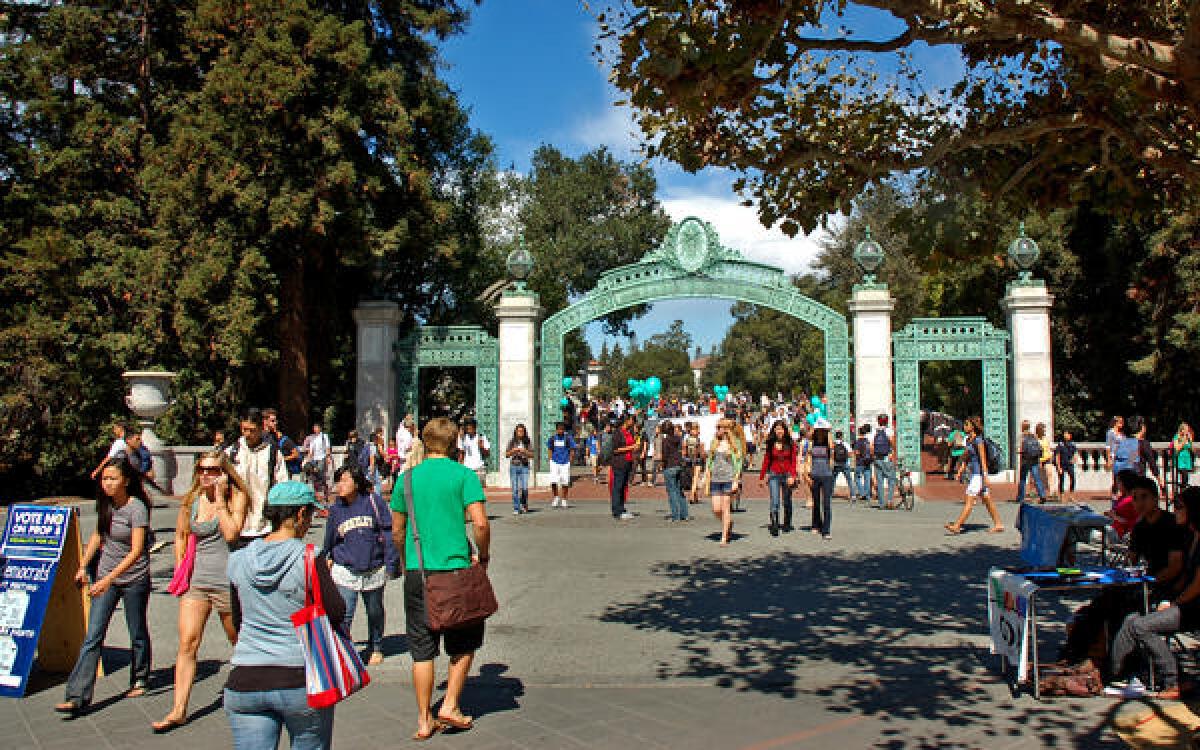
In the ongoing debate over how many Californians attend the University of California and the system’s funding, two legislators say it’s time to impose a limit on the number of students who aren’t state residents.
Assemblymen Kevin McCarty (D-Sacramento) and Jose Medina (D-Riverside) have introduced a bill to cap nonresident enrollment at current levels. The bill comes on the heels of a report showing fewer Californians admitted for the fall 2015 freshman class, but an increase in those hailing from outside the Golden State.
“This measure will refocus the UC’s commitment to ensure access for California’s students,” said McCarty in a written statement.
The most selective campuses, including UCLA and UC Berkeley, have capped out of state enrollment. Nonetheless, lawmakers have remained critical of what they’ve called a reliance on the higher tuition paid by nonresidents to help fund UC’s operations. And last fall, UC President Janet Napolitano again promised a plan to boost the ranks of in-state students.
The new legislation, AB 1711, would also require half of the revenues collected from nonresident enrollment to boost resident enrollment on the university’s 10 campuses.
Senate seeks to remove deadline for cities to ban marijuana farms
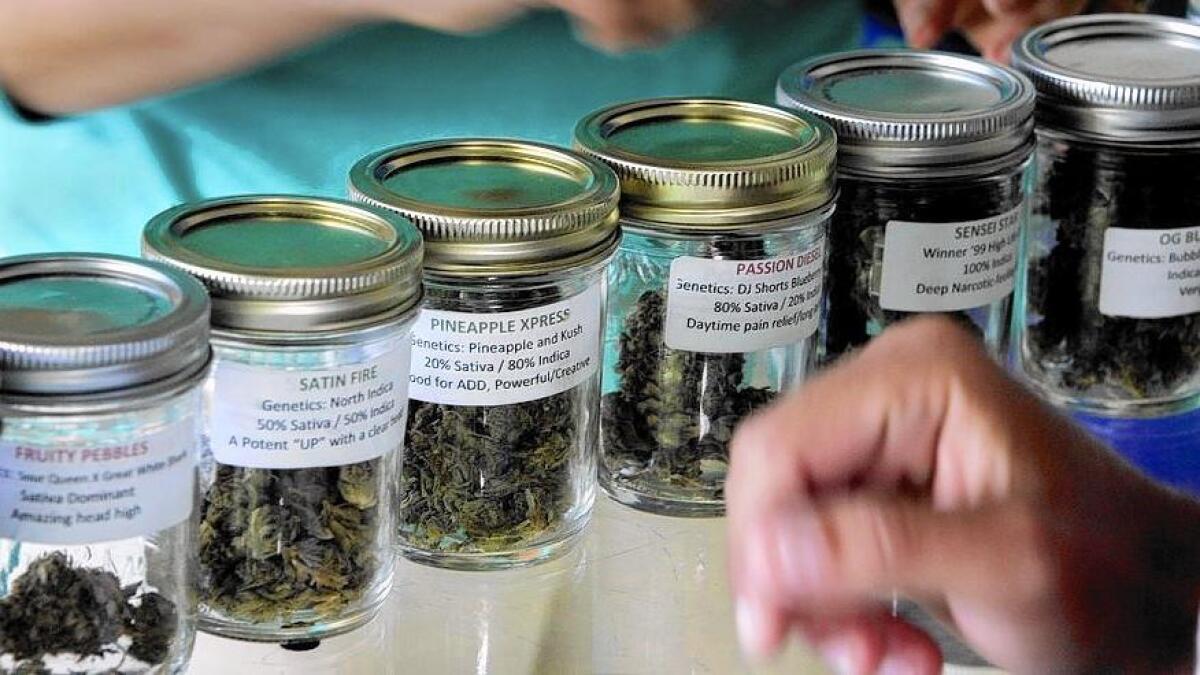
The state Senate on Monday approved a measure that would eliminate a March 1 deadline mistakenly set for cities to regulate or ban the growing of medical marijuana in California.
The measure, which next goes to the Assembly, is aimed at a deadline inadvertently put into legislation approved last year that creates a system for regulating and taxing the cultivation, transport and sale of medical marijuana in California.
In response, 97 cities and seven counties have voted to ban the growing of medical marijuana in their jurisdictions out of concern that failure to act would allow the state to set the rules.
“Nobody intended to give local lawmakers such a short timeline to develop regulations for an industry as complex as medical cannabis,” said Jim Wood (D-Healdsburg), the author of AB 21.
Sen. Jim Nielsen (R-Gerber) was one of three lawmakers to vote against the bill, arguing he does not trust that the new system will benefit the state.
“An industry has been created and abuses have been great,” Nielsen said. “As a farmer its hard for me to take to legitimize medical marijuana by making it a bonafide agricultural endeavor.”
California lawmakers ask for fishery disaster after delay in crab season

Eleven state legislators called Monday for Gov. Jerry Brown to declare a fishery disaster in response to the economic hardships caused by the delay of the California crab season.
State health officials have delayed the Dungeness crab season since November, citing high levels of domoic acid in crab that make it unsafe for public consumption.
A disaster declaration would allow the state to seek federal relief funds, according to the letter to the governor.
“The continued delays have created unprecedented damage to the crab market, and irreparable harm to the thousands who depend on a healthy harvest for their living,” the letter said.
School bond backers push forward with November initiative
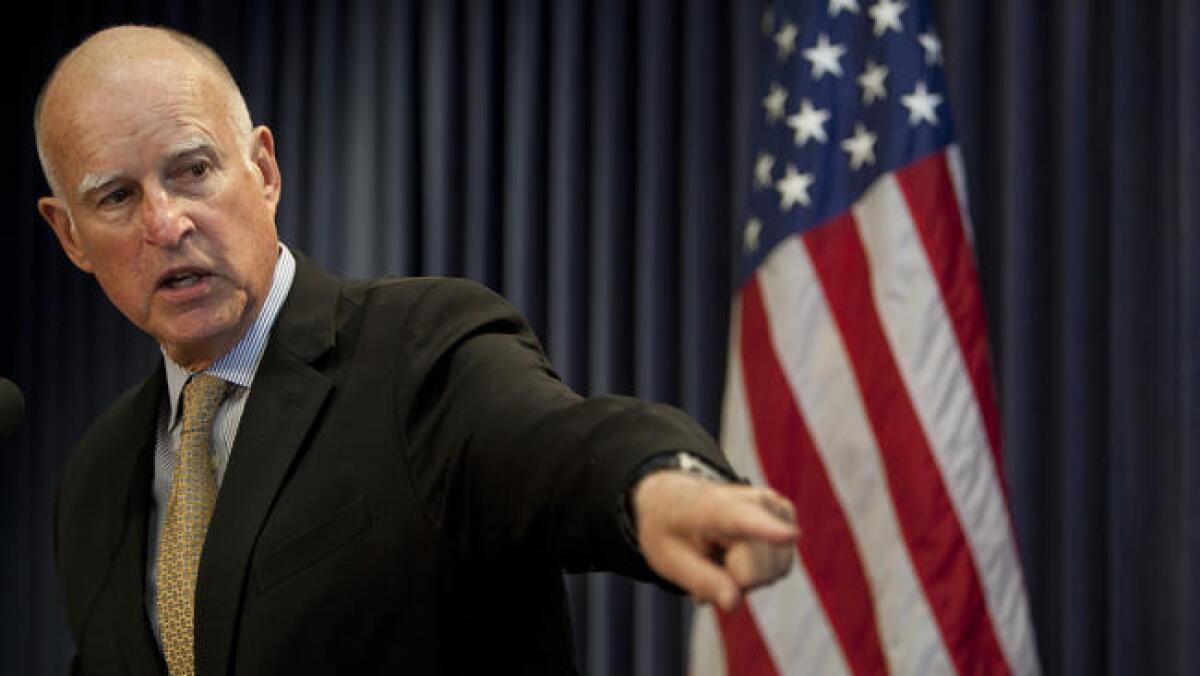
If there’s anyone eager to follow Gov. Jerry Brown’s request for a legislative version of a statewide school bond for 2016, it’s hard to find them.
In fact, what really stands out in the weeks since Brown made that suggestion is just how many prominent politicians have done just the opposite, choosing to endorse the $9-billion school bond written by interest groups and already qualified for the November ballot.
It’s worth pausing to note how things got to where they are. Advocates for a school bond failed to gain any traction for the idea in the state Capitol in 2014 or 2015, largely pointing to Brown’s reluctance to endorse the idea. In 2014, the focus was on a statewide water bond and observers suggested two large bonds on the ballot would simply be too much.
In 2015, the governor’s proposed budget suggested traditional statewide bonds for school projects should be a thing of the past, urging instead a “dialogue on the future of school facilities funding.”
That prompted the building industry, among others, to gather signatures for a statewide bond initiative. And with every day come new big endorsements. Last week, it was Assembly GOP Leader Chad Mayes (R-Yucca Valley). Now, an endorsement from John Burton, chairman of the California Democratic Party and a former state Senate leader. Add to that official support from heavy hitters like the California Chamber of Commerce.
The governor wants a smaller bond, with money earmarked for some schools above others, and one that’s placed before voters in June. The daily drip of big time endorsements for the November version, however, suggest he’s not making much headway.
NBA championship trophy -- and legend Jerry West -- visits the Capitol
California state legislators had a special guest in their midst Monday: the National Basketball Assn. championship trophy, currently in the possession of last year’s champs, the Golden State Warriors.
Oh, and there was a slightly taller VIP as well: Hall of Famer Jerry West, a renowned guard for the Los Angeles Lakers who currently serves as an executive for the Warriors.
West and the trophy were on hand for today’s Assembly session. They’ll be swinging by the Senate when it convenes its floor session later this afternoon.
Lawmakers were quick to snap shots with West and the trophy:
Listen: The State of Things
This week’s California Politics Podcast discusses the governor’s State of the State address and what it portends for the statehouse battles of 2016.
It also examines a push for more disclosure of lobbying expenses by state regulators, and a little of what the podcast calls “side dish” talk on the U.S. Senate race and a bipartisan alliance in the suburbs east of San Francisco.
You can subscribe to the podcast via iTunes here.
California’s ATM is open for the Clinton family
Get ready for a host of Clintons to descend on California to raise money, according to invitations obtained by The Times.
Chelsea Clinton is scheduled to appear Monday at a Newport Coast fundraiser at the home of Michael and Sholeh Chegini. Then she will raise money in the evening at an event hosted by famed architect Frank Gehry and co-hosted by Maria Camacho, Elsa Collins and Michael Kives. Both events are $250 per person, or for $1,000, the donor can take a photo with the former first daughter.
She will appear Tuesday morning at the Lantern House in Venice for a $150-per-person event hosted by Scott Mayers.
Former President Bill Clinton is in the Bay Area on Monday, set to attend a Hillsborough event hosted by Rep. Jackie Speier, Joe Cotchett, Nanci Nishimura and Barry Dennis. That event is $1,000, or $2,700 also gets the donor a photo with the guest of honor.
The Democratic presidential hopeful herself is to appear again in Los Angeles for a Feb. 22 evening fundraiser at the home of Ellen Goldsmith-Vein and Jon Vein.
The base contribution is $2,700, or people who raise $10,000 as a co-host can take a photo with Clinton. Those who raise $27,000 get to attend a private reception before the event.